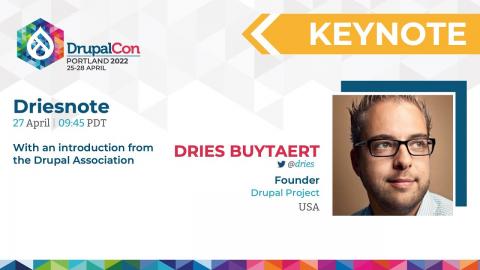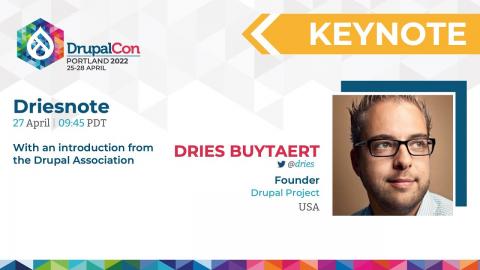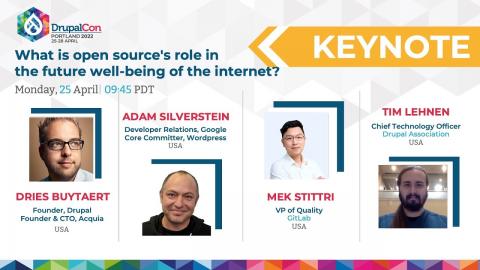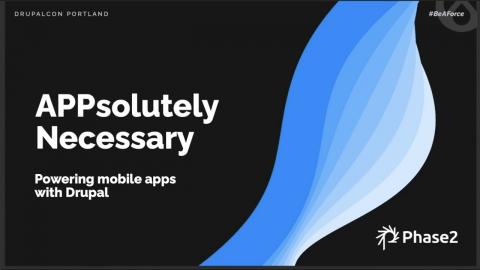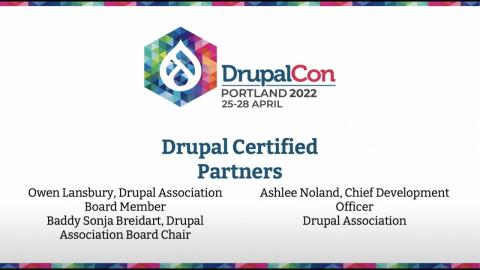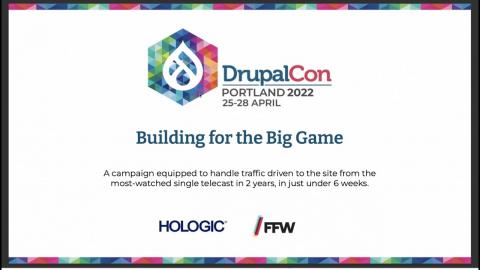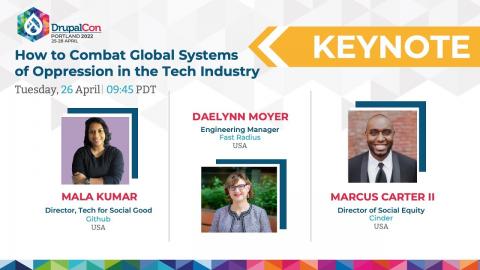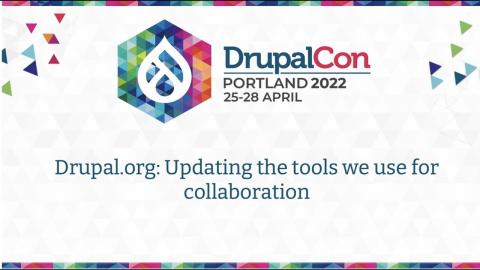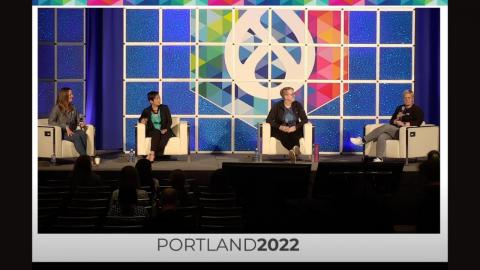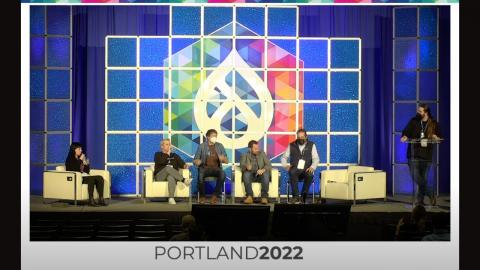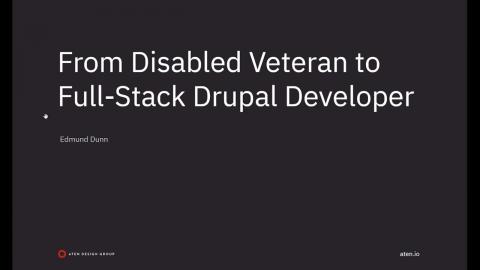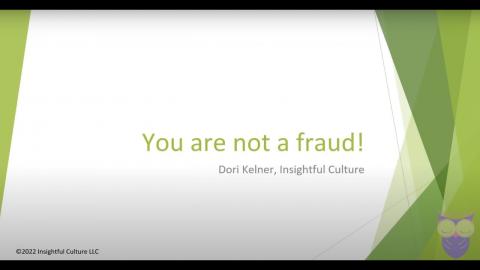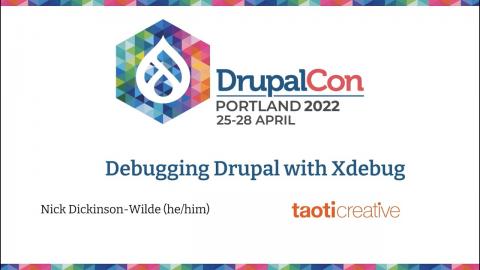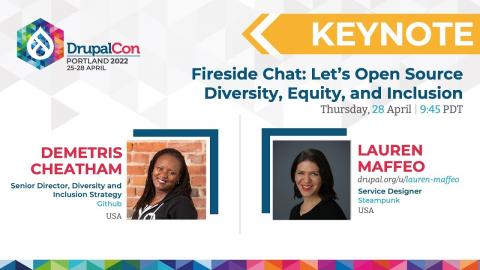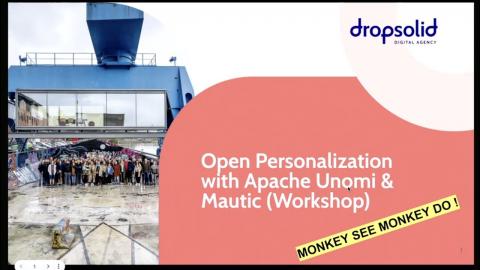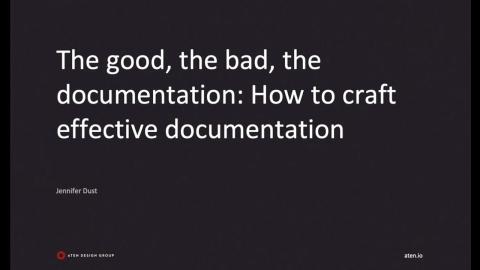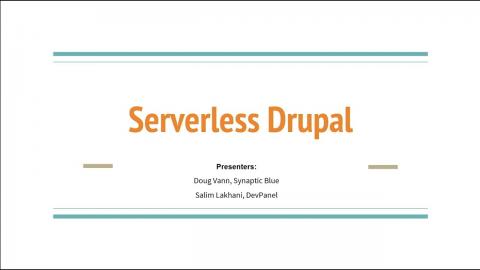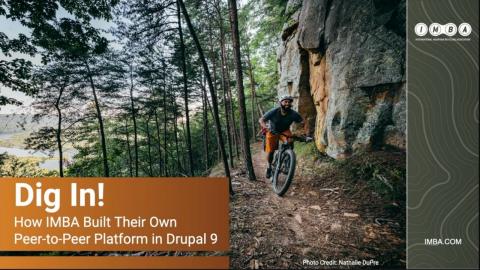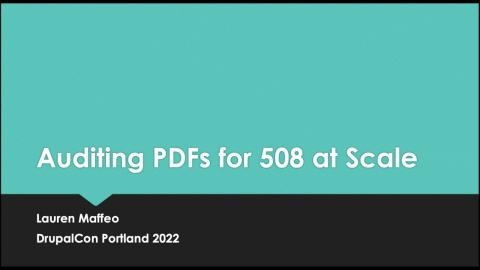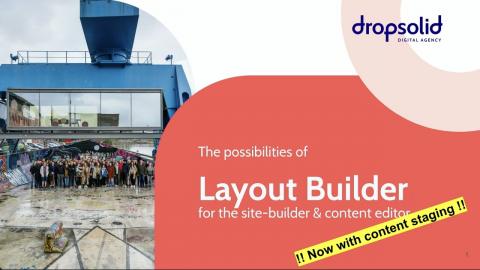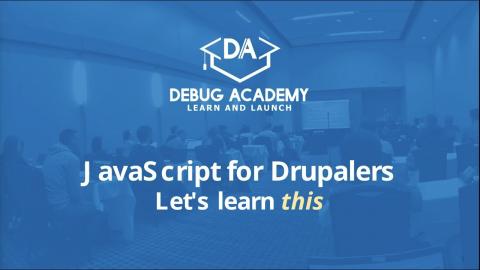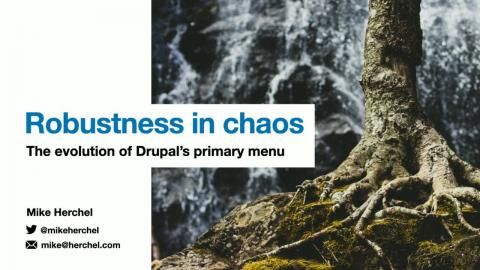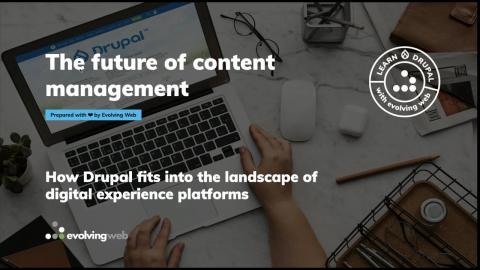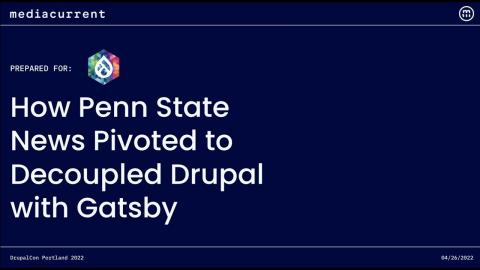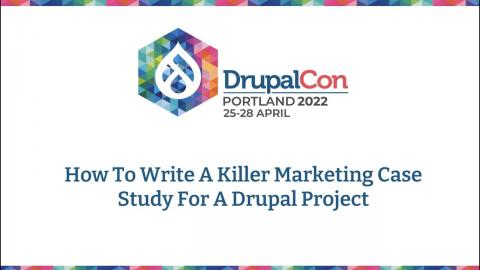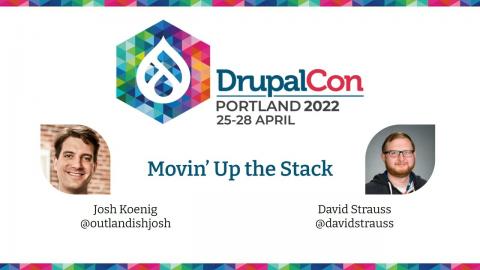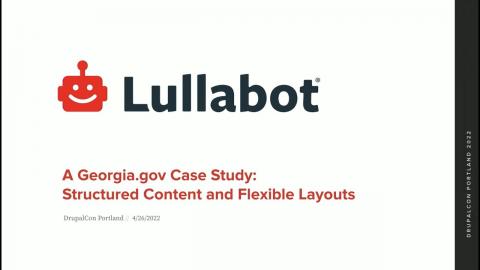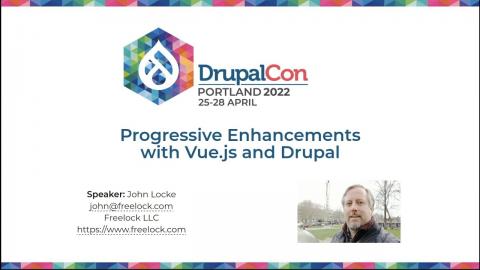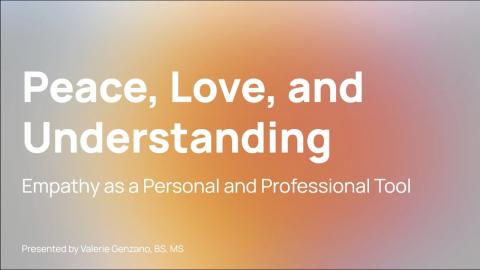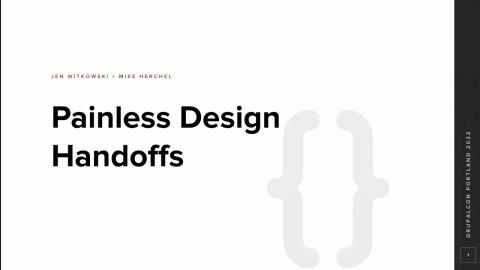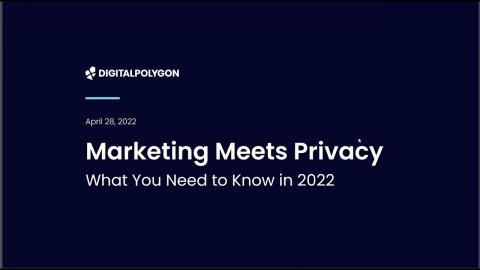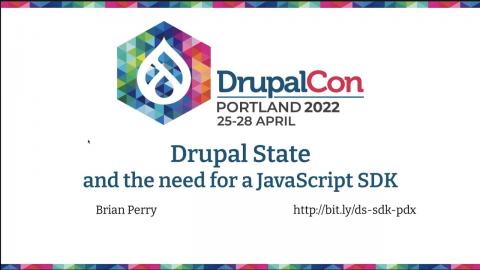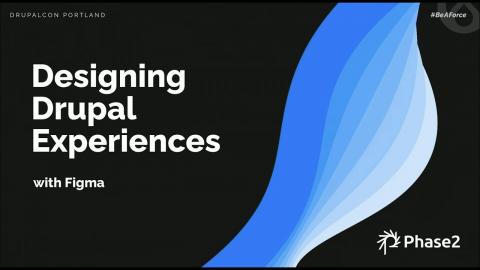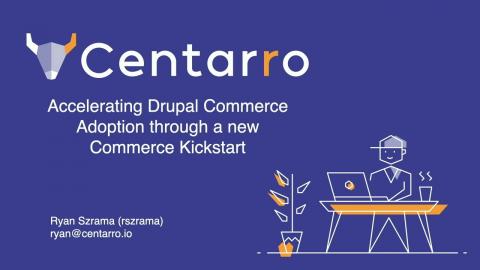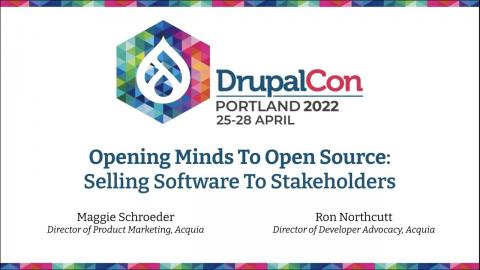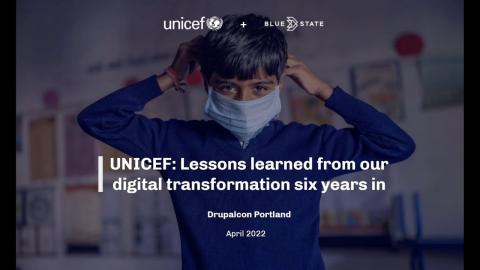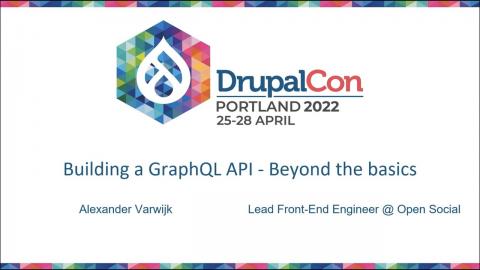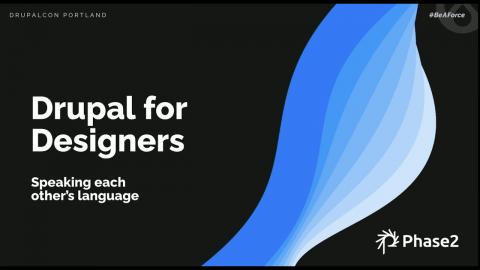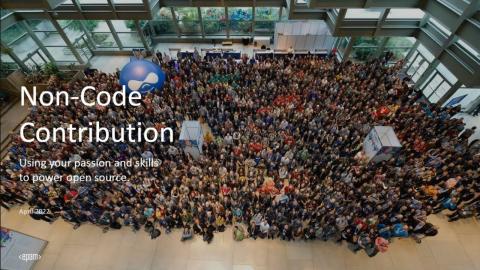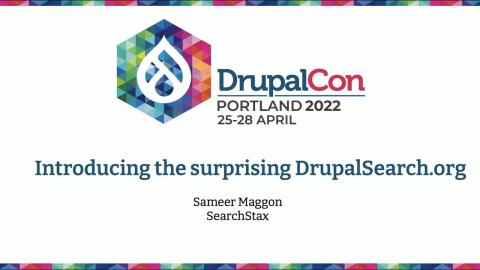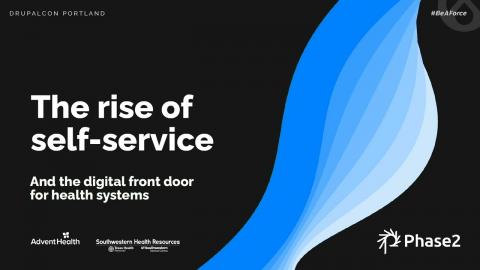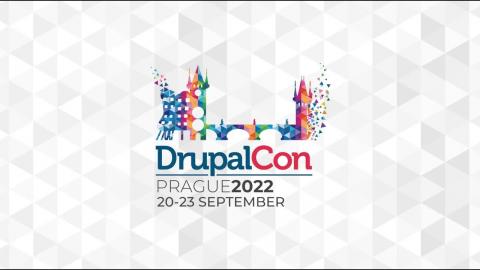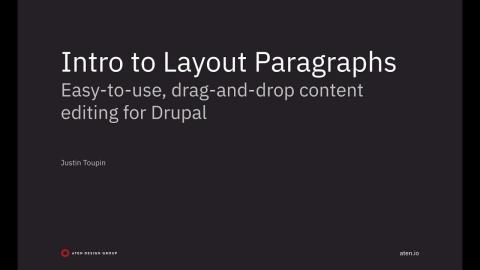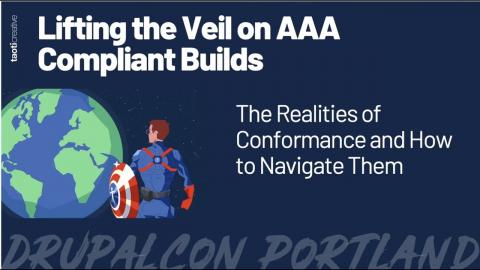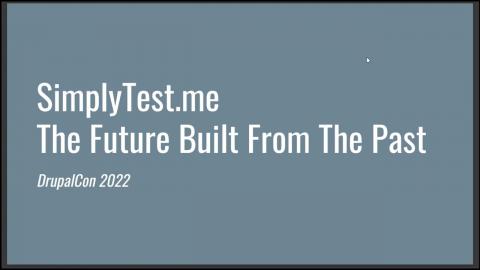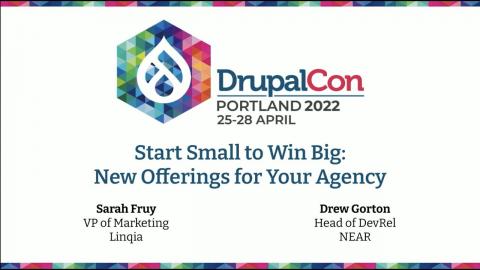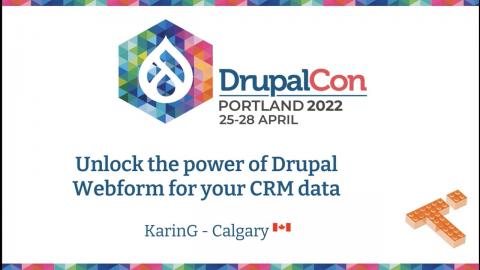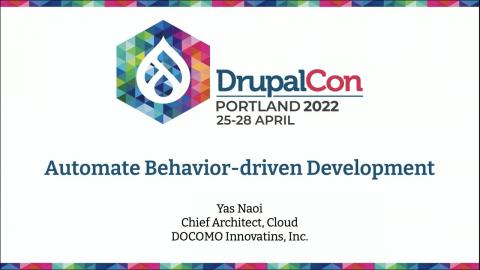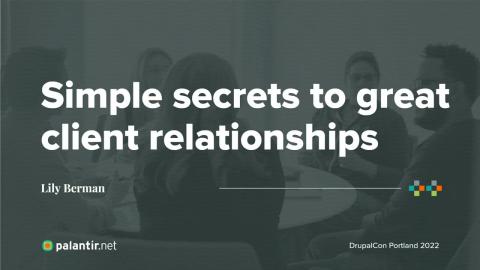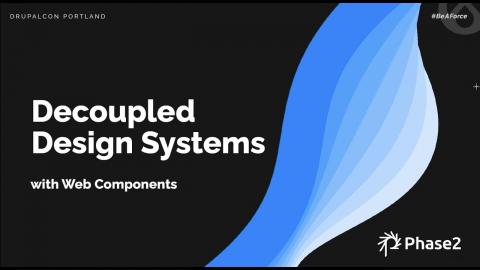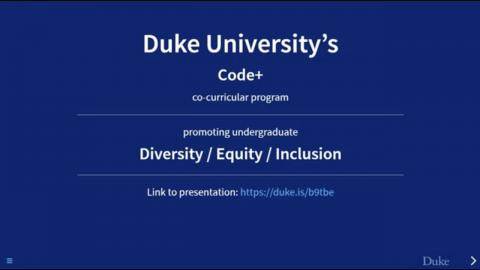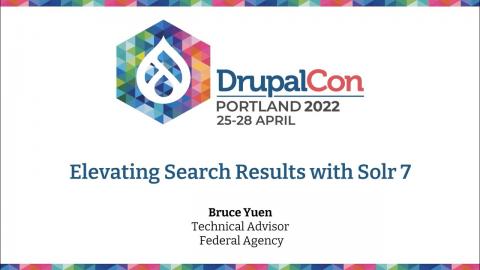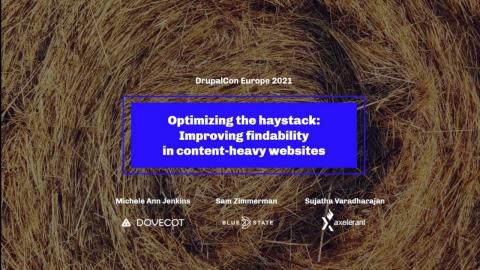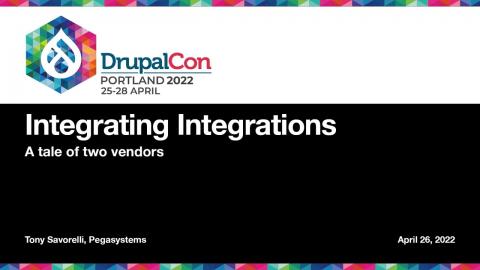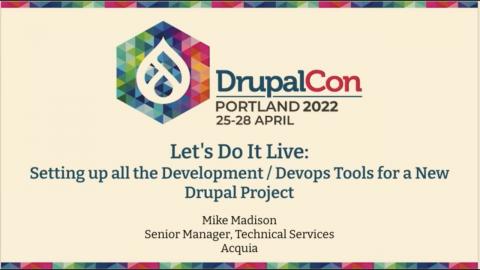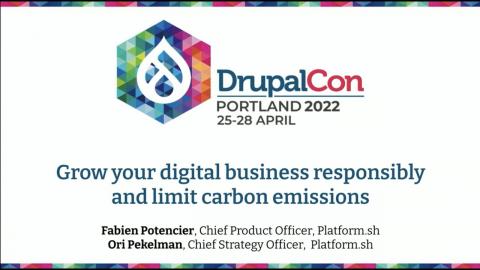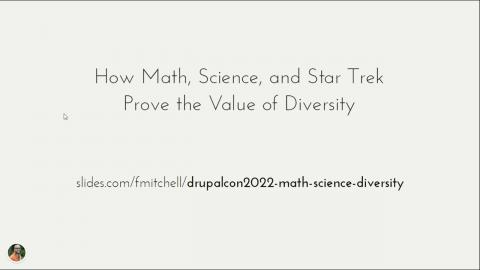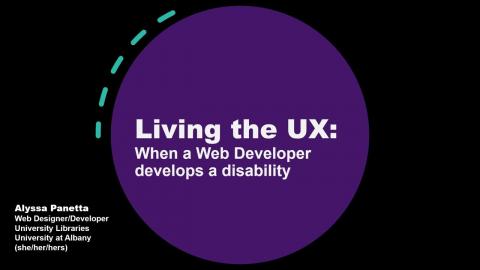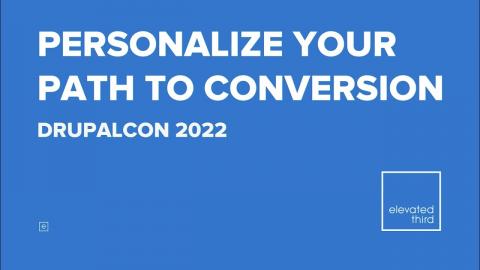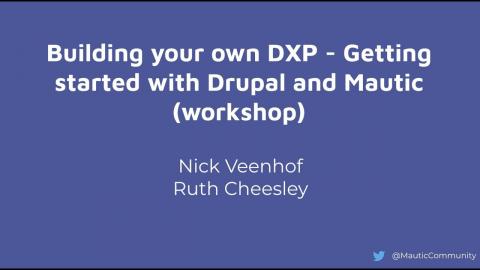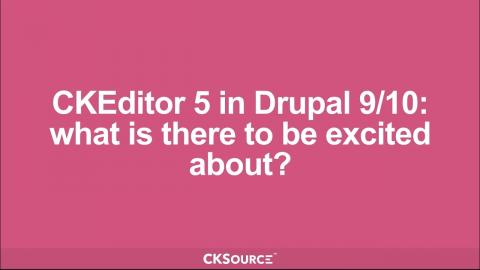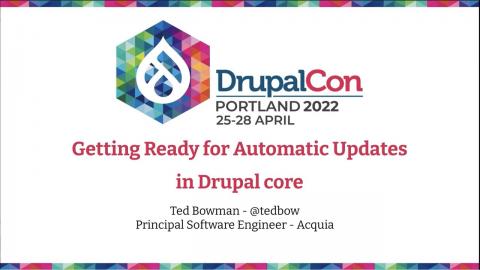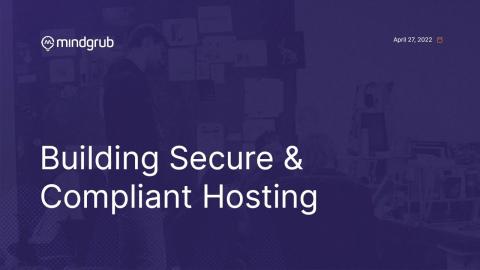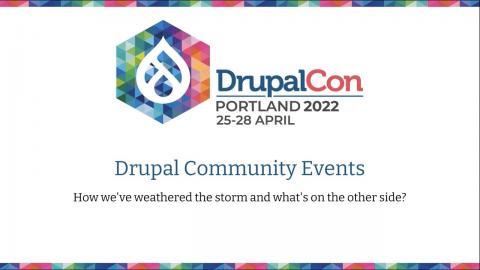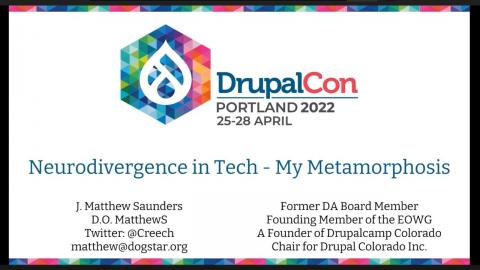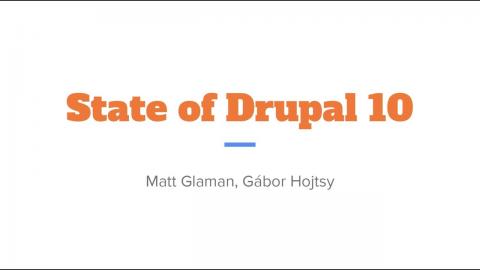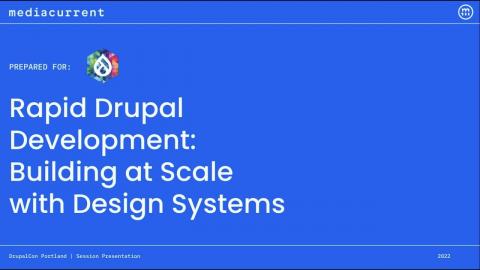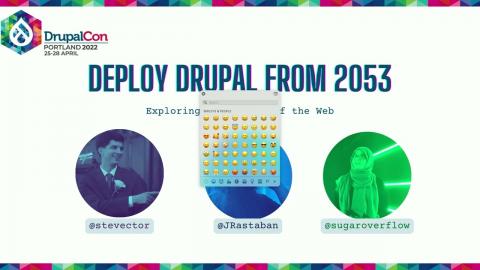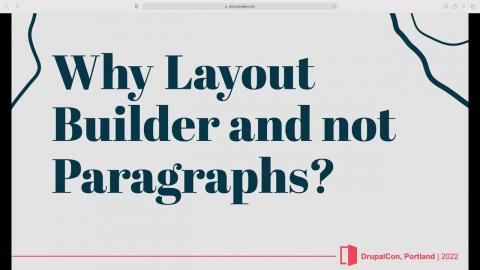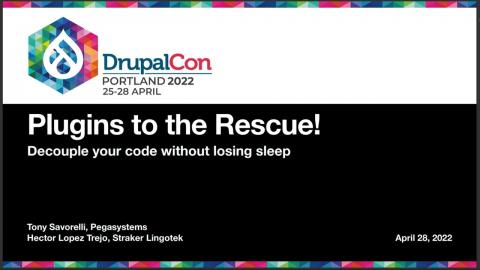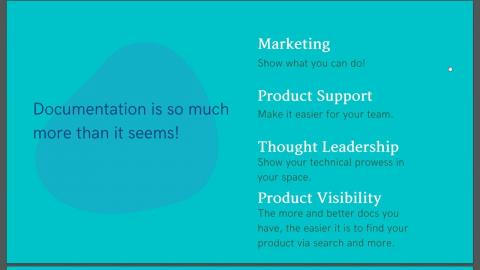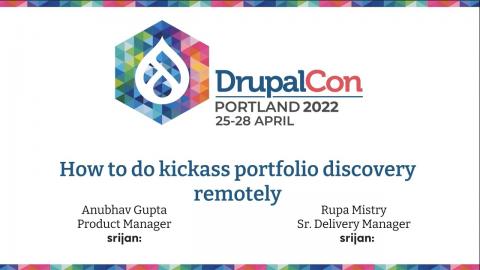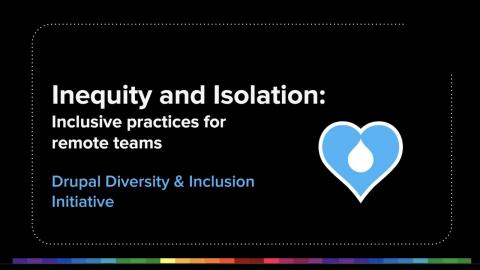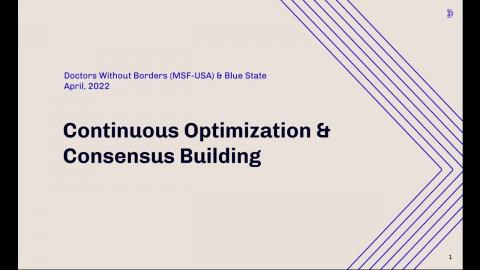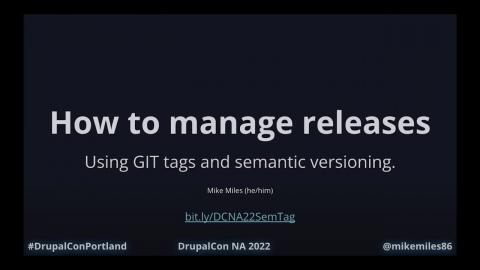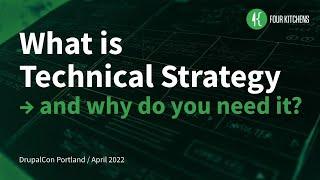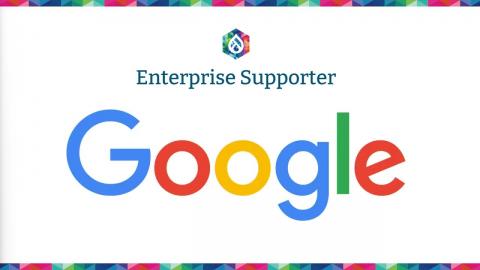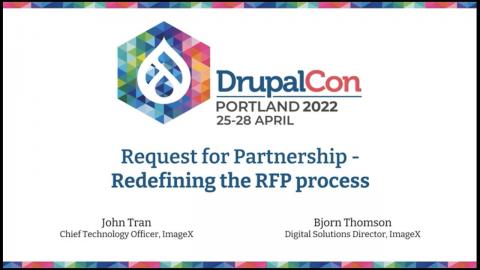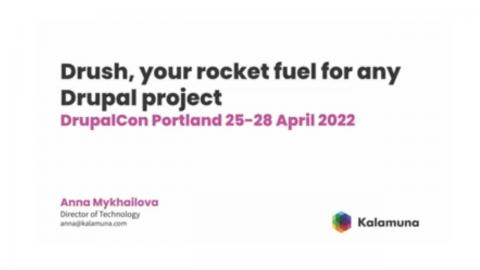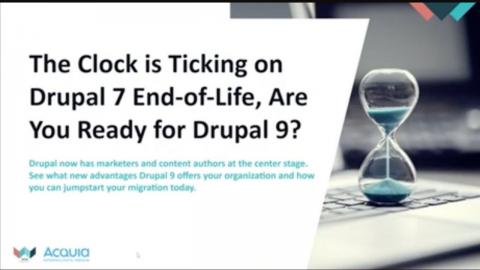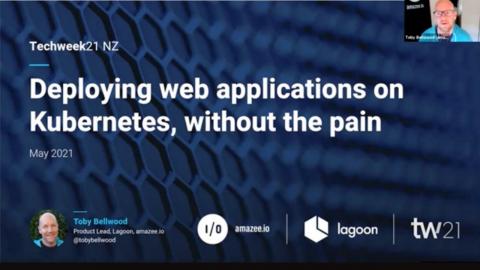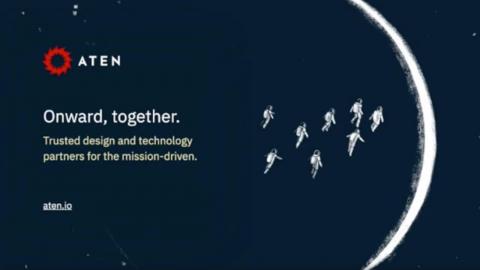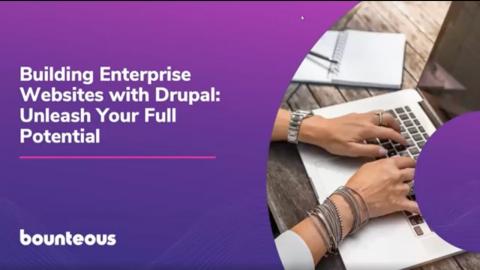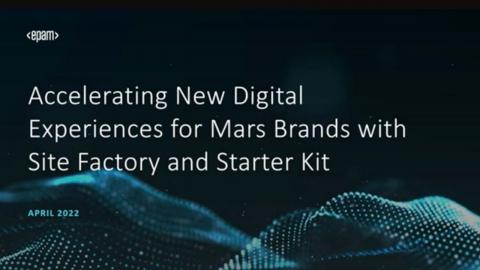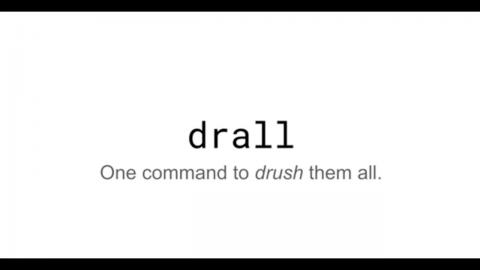Introduction
Videos from DrupalCon Portland 2022
Video Sponsor(s) / Provided by
Curated Videos
Description
Speaker: Dries Buytaert
Prenote Speaker: Tim Lehnen and Ashlee Noland
During his keynote - a.k.a. Driesnote - Dries will give one of his engaging keynotes about the state of the Drupal project. Belgium-born Drupal founder Dries Buytaert is a pioneer in the open source web publishing and digital experience platform space.
Prenote Speaker: Tim Lehnen and Ashlee Noland
During his keynote - a.k.a. Driesnote - Dries will give one of his engaging keynotes about the state of the Drupal project. Belgium-born Drupal founder Dries Buytaert is a pioneer in the open source web publishing and digital experience platform space.
Description
Speakers: Dries Buytaert, Adam Silverstein, Mek Stritti
Moderated by Tim Lehnen
What is the future of the well-being of the internet?
The internet is an omnipresent part of our lives. We are more connected than ever before - and in recent times where we have been physically isolated from each other, we found ourselves plugged into the 'net for work, school, healthcare, play-- just about everything we do.
At the same time, new technologies are coming online that may transform the web as we know it, just as major internet businesses come under scrutiny for antitrust concerns, and privacy and security concerns come to the forefront.
We've witnessed the lows of disinformation campaigns, fraud, and a gold rush for digital currency, and seen the highs of a network that lets us connect and support each other across borders and boundaries.
What is the future of this network at the center of our lives? How do we preserve the good it can do and mitigate the bad? How will open source play a role in the future of the 'net?
Moderated by Tim Lehnen
What is the future of the well-being of the internet?
The internet is an omnipresent part of our lives. We are more connected than ever before - and in recent times where we have been physically isolated from each other, we found ourselves plugged into the 'net for work, school, healthcare, play-- just about everything we do.
At the same time, new technologies are coming online that may transform the web as we know it, just as major internet businesses come under scrutiny for antitrust concerns, and privacy and security concerns come to the forefront.
We've witnessed the lows of disinformation campaigns, fraud, and a gold rush for digital currency, and seen the highs of a network that lets us connect and support each other across borders and boundaries.
What is the future of this network at the center of our lives? How do we preserve the good it can do and mitigate the bad? How will open source play a role in the future of the 'net?
Description
Speakers: Amy Novikau and Gregg Shanefelt
Native and mobile apps allow you to reach your customers where they already are via app stores. Users are spending more time on mobile devices than on desktops. Mobile versions of websites are no longer enough to satisfy today’s customers. Each device platform has its own unique user experience that users are used to and deviating from these known patterns can create a jarring experience.
In this session, we’ll discuss architecture patterns to create an App Store cross platform mobile app with React Native using Drupal as a data source. Along with this we’ll also define best practices for presenting content on both Android and iOS. The session will have take-aways for both developers and content strategists alike.
We will discuss some of the intricacies that go into delivering a great digital experience that complements your larger digital product strategy.
Native and mobile apps allow you to reach your customers where they already are via app stores. Users are spending more time on mobile devices than on desktops. Mobile versions of websites are no longer enough to satisfy today’s customers. Each device platform has its own unique user experience that users are used to and deviating from these known patterns can create a jarring experience.
In this session, we’ll discuss architecture patterns to create an App Store cross platform mobile app with React Native using Drupal as a data source. Along with this we’ll also define best practices for presenting content on both Android and iOS. The session will have take-aways for both developers and content strategists alike.
We will discuss some of the intricacies that go into delivering a great digital experience that complements your larger digital product strategy.
Description
Facilitators: Owen Lansbury and Ashlee Noland
Engage with the DA team and learn more about our most recent piloted program; the Drupal Certified Partner Program. This is an elevated level of involvement and support of the Drupal Association and the Drupal Project spun from our current Supporting Partner program. Drupal needs significantly more contribution for the project to remain competitive in the longer term and new models to incentivize and recognize contribution are required to achieve this.
Download the handout here!
l.ead.me/DCP-program
Engage with the DA team and learn more about our most recent piloted program; the Drupal Certified Partner Program. This is an elevated level of involvement and support of the Drupal Association and the Drupal Project spun from our current Supporting Partner program. Drupal needs significantly more contribution for the project to remain competitive in the longer term and new models to incentivize and recognize contribution are required to achieve this.
Download the handout here!
l.ead.me/DCP-program
Description
Speakers: Emily Becker and Ricardo Osuna
Could your web platform handle a surge of engagement stemming from one of the world’s most watched TV programs? An ad featuring Mary J Blige from Hologic was going to be featured at the Big Game to promote Well Woman exams, and they needed a microsite that would be able to withstand and capitalize on the heavy influx of traffic from the exposure, while also engaging a brand new audience with no prior awareness of them. Learn how Hologic and FFW created a microsite using Acquia Site Studio for the campaign, and how you can apply our experience when your own organization needs to scale to meet higher engagement demands.
Could your web platform handle a surge of engagement stemming from one of the world’s most watched TV programs? An ad featuring Mary J Blige from Hologic was going to be featured at the Big Game to promote Well Woman exams, and they needed a microsite that would be able to withstand and capitalize on the heavy influx of traffic from the exposure, while also engaging a brand new audience with no prior awareness of them. Learn how Hologic and FFW created a microsite using Acquia Site Studio for the campaign, and how you can apply our experience when your own organization needs to scale to meet higher engagement demands.
Description
Speakers: Marcus Carter II, Mala Kumar, Daelynn Moyer
Moderated by Von R. Eaton
The 2019 Driesnote talks a bit about the diversity, equity, and inclusion challenge in open source (starting around 31 minutes). We know based on participation at events, our programs, and high-level data collection around the Project that Drupal follows the same data trends around marginalized people. Marginalized people are defined as those who have experienced and continue to experience harm because of global systems of oppression.
In this Keynote, join us in hearing from Daelynn Moyer, Mala Kumar, and Marcus Carter - impactful thought leaders in justice, equity, and technology - as they provide deep insights into inequity, the experiences of marginalized people in the tech industry, and the tangible action steps we can take with us into our daily lives to ensure equity for all in Drupal.
Moderated by Von R. Eaton
The 2019 Driesnote talks a bit about the diversity, equity, and inclusion challenge in open source (starting around 31 minutes). We know based on participation at events, our programs, and high-level data collection around the Project that Drupal follows the same data trends around marginalized people. Marginalized people are defined as those who have experienced and continue to experience harm because of global systems of oppression.
In this Keynote, join us in hearing from Daelynn Moyer, Mala Kumar, and Marcus Carter - impactful thought leaders in justice, equity, and technology - as they provide deep insights into inequity, the experiences of marginalized people in the tech industry, and the tangible action steps we can take with us into our daily lives to ensure equity for all in Drupal.
Description
The Drupal Association Engineering team is excited to give our bi-annual update on features and improvements we've been making to the home of the community. At each DrupalCon we review recent changes and look ahead to upcoming improvements. At DrupalCon Portland, we'll have quite a lot to talk about:
- Gitlab Acceleration - come for an update on GitLabCI, migrating Drupal.org issues, and plans for contribution credit
- Collaboration with core - learn how the Drupal Association team interfaces with the Drupal core team, and initiatives we are collaborating on
- Securing the supply chain - how are we keeping sites safe with Automatic Updates?
- Drupal.org and our sub-sites are moving to Drupal 9 (and soon 10!) - come learn more.
This session will be an informal panel and Q&A - so if you've ever been curious how the support structure for the Drupal community is managed - come join us!
- Gitlab Acceleration - come for an update on GitLabCI, migrating Drupal.org issues, and plans for contribution credit
- Collaboration with core - learn how the Drupal Association team interfaces with the Drupal core team, and initiatives we are collaborating on
- Securing the supply chain - how are we keeping sites safe with Automatic Updates?
- Drupal.org and our sub-sites are moving to Drupal 9 (and soon 10!) - come learn more.
This session will be an informal panel and Q&A - so if you've ever been curious how the support structure for the Drupal community is managed - come join us!
Description
Speakers: Ruth Cheesley, Lo Li, Kat White
Moderated by Baddý Sonja Breidert
Drupal is one of the more diverse open source communities in the tech world regarding gender balance. There are women in leadership roles across many agencies, consultancies, and end-user organizations in the Drupal space. And yet, very few of these women in executive leadership occupy important technical positions such as CTO or CIO.
Join this interactive panel discussion featuring women successfully serving in technical executive leadership roles to discuss frustrations and potential solutions around the lack of representation, issues with imposter syndrome and implicit bias, and why it’s simply a great business strategy to include women as technical leaders. No slides here, just real chat!
Moderated by Baddý Sonja Breidert
Drupal is one of the more diverse open source communities in the tech world regarding gender balance. There are women in leadership roles across many agencies, consultancies, and end-user organizations in the Drupal space. And yet, very few of these women in executive leadership occupy important technical positions such as CTO or CIO.
Join this interactive panel discussion featuring women successfully serving in technical executive leadership roles to discuss frustrations and potential solutions around the lack of representation, issues with imposter syndrome and implicit bias, and why it’s simply a great business strategy to include women as technical leaders. No slides here, just real chat!
Description
Join the board and staff of the Drupal Association, and learn more about the non-profit that fosters the Drupal Community.
Description
Speaker: Edmund Dunn
As of August 2020, there are over 4.7 million disabled Veterans in the United States. They are all dealing with a variety of disabilities connected to their time in the service. To say this is an under-represented group is an understatement. With the right help, these Veterans can transition into the tech industry which is chronically short of developers of all stripes.
I received help and followed a path to becoming a Drupal developer. I will outline my path to becoming a Drupal developer through the VAs Vocational Rehabilitation Program and use it as an example of what disabled Veterans can do to get started in Drupal. I will also speak to what employers can do to assist Veterans who want to become Drupal developers.
This session will cover:
- Summary of my path to becoming a Drupal developer.
- The things that disabled Veterans can do to become Drupal developers.
- The support I receive from Aten and how employers can support disabled Veterans on their staff
- Summary of assistance available from the VA, i.e. Vocational Rehabilitation, GI Bill
- The benefits for Veterans in becoming a Drupal developer.
- How to approach job applications and the hiring process
This session is for:
- Disabled Veterans just getting started as a developer
- Disabled Veterans getting started with Drupal
- Employers looking for qualified developers who are looking to diversify their staff
- Community members seeking Veteran outreach opportunities
As of August 2020, there are over 4.7 million disabled Veterans in the United States. They are all dealing with a variety of disabilities connected to their time in the service. To say this is an under-represented group is an understatement. With the right help, these Veterans can transition into the tech industry which is chronically short of developers of all stripes.
I received help and followed a path to becoming a Drupal developer. I will outline my path to becoming a Drupal developer through the VAs Vocational Rehabilitation Program and use it as an example of what disabled Veterans can do to get started in Drupal. I will also speak to what employers can do to assist Veterans who want to become Drupal developers.
This session will cover:
- Summary of my path to becoming a Drupal developer.
- The things that disabled Veterans can do to become Drupal developers.
- The support I receive from Aten and how employers can support disabled Veterans on their staff
- Summary of assistance available from the VA, i.e. Vocational Rehabilitation, GI Bill
- The benefits for Veterans in becoming a Drupal developer.
- How to approach job applications and the hiring process
This session is for:
- Disabled Veterans just getting started as a developer
- Disabled Veterans getting started with Drupal
- Employers looking for qualified developers who are looking to diversify their staff
- Community members seeking Veteran outreach opportunities
Description
Speaker: Dori Kelner
According to a 2018 report by Blind, 58% of tech employees experience imposter syndrome. Despite your achievements, you may experience self-doubt about your capabilities and feel undeserving of your accomplishments. You are constantly doubting your competency. How is it possible that even after so many years at work – with all your success, accolades, and promotions – you still feel uncomfortable in your abilities?
We often try to overcompensate for these feelings of inadequacy by either working longer and harder, or by procrastinating, or through perfectionism. This leads to anxiety and burnout. We are literally adding unneeded pressure to a career that is already fast-paced and stressful. Having experienced this through much of my career, I can relate to how imposter syndrome impacts our mental health daily.
The truth is, you are perfectly capable of doing your work. Your success is not due to luck and your achievements have value. But your mind isn’t playing along. In this session, we will discuss the science of mind games that lead to imposter syndrome. You will learn strategies for how to regain control of your thoughts to celebrate growth and success. Join us on a journey that will impact your career for a lifetime.
According to a 2018 report by Blind, 58% of tech employees experience imposter syndrome. Despite your achievements, you may experience self-doubt about your capabilities and feel undeserving of your accomplishments. You are constantly doubting your competency. How is it possible that even after so many years at work – with all your success, accolades, and promotions – you still feel uncomfortable in your abilities?
We often try to overcompensate for these feelings of inadequacy by either working longer and harder, or by procrastinating, or through perfectionism. This leads to anxiety and burnout. We are literally adding unneeded pressure to a career that is already fast-paced and stressful. Having experienced this through much of my career, I can relate to how imposter syndrome impacts our mental health daily.
The truth is, you are perfectly capable of doing your work. Your success is not due to luck and your achievements have value. But your mind isn’t playing along. In this session, we will discuss the science of mind games that lead to imposter syndrome. You will learn strategies for how to regain control of your thoughts to celebrate growth and success. Join us on a journey that will impact your career for a lifetime.
Description
Speaker: Nick Dickinson-Wilde
Xdebug is a PHP extension that can massively improve your debugging experience and speed – for both backend and frontend developers. Conversely, it can also significantly slow down your php execution speed, so you want to only enable when you are using it. Xdebug works with most IDEs but I will be specifically showcasing usage with PHPStorm & VSCode.
Given certain history of statements in the PHP community, I do want to emphasize something; Xdebug usage is unrelated to seniority or development expertise.
Xdebug is a great tool - and way faster for me than most other methods in most situations. However there are definitelly situations that other debugging methods will be better Having Xxebug in your box of personal tools doesn't mean you have to switch everything, it is just another tool that you can use.
There are cases that Xdebug really excels compared to other options – such as building migrations, or other processes that run through the same code paths many times with slightly different variables.
Additionally, Xdebug can debug twig and let you explore available variables without worrying about memory. This use case is often a significant speed improvement over kint() or other variable dumping methods that may show incomplete data to get around memory limits.
After basic installation/configuration, we will debug a spreadsheet to Drupal migration for a bit of real world usage.
Xdebug is a PHP extension that can massively improve your debugging experience and speed – for both backend and frontend developers. Conversely, it can also significantly slow down your php execution speed, so you want to only enable when you are using it. Xdebug works with most IDEs but I will be specifically showcasing usage with PHPStorm & VSCode.
Given certain history of statements in the PHP community, I do want to emphasize something; Xdebug usage is unrelated to seniority or development expertise.
Xdebug is a great tool - and way faster for me than most other methods in most situations. However there are definitelly situations that other debugging methods will be better Having Xxebug in your box of personal tools doesn't mean you have to switch everything, it is just another tool that you can use.
There are cases that Xdebug really excels compared to other options – such as building migrations, or other processes that run through the same code paths many times with slightly different variables.
Additionally, Xdebug can debug twig and let you explore available variables without worrying about memory. This use case is often a significant speed improvement over kint() or other variable dumping methods that may show incomplete data to get around memory limits.
After basic installation/configuration, we will debug a spreadsheet to Drupal migration for a bit of real world usage.
Description
Much of Drupal's reputation for security is thanks to the tireless efforts of the Drupal Security team.
If you'd like to learn more about what the Drupal Security team is, how it works, and how you can join to help keep Drupal Secure, this session is a great place to start.
We'll also be talking about Drupal 7's end of life and long term security plans, as well as the Drupal Steward program.
If you'd like to learn more about what the Drupal Security team is, how it works, and how you can join to help keep Drupal Secure, this session is a great place to start.
We'll also be talking about Drupal 7's end of life and long term security plans, as well as the Drupal Steward program.
Description
Speaker: Demetris Cheatham
Moderated by Lauren Maffeo
To truly advance diversity, equity and inclusion (DEI), stakeholders from across the entire open source ecosystem must come together transparently and collaboratively as a community. In 2021 we launched All In,an open source community whose mission is to advance DEI through access, community, equity and data.
To date All In has shipped:
The 2021 Open Source Diversity, Equity and Inclusion Survey in partnership with the Linux Foundation;
A Maintainers Listening Tour which is a series of focus groups and individual interviews with maintainers interested in advancing DEI within their communities; and
All In for Students, a paid 12-month program which provides open source education, career development and hands-on open source experience for select students attending Minority Serving Institutions.
This fireside chat will be a discussion of what we’ve learned and heard directly from the open source community - the progress we’ve made, the challenges that still persist and what each of us can do, big and small, to create a more inclusive open source for everyone.
Join us! Let’s open source diversity, equity and inclusion!
Moderated by Lauren Maffeo
To truly advance diversity, equity and inclusion (DEI), stakeholders from across the entire open source ecosystem must come together transparently and collaboratively as a community. In 2021 we launched All In,an open source community whose mission is to advance DEI through access, community, equity and data.
To date All In has shipped:
The 2021 Open Source Diversity, Equity and Inclusion Survey in partnership with the Linux Foundation;
A Maintainers Listening Tour which is a series of focus groups and individual interviews with maintainers interested in advancing DEI within their communities; and
All In for Students, a paid 12-month program which provides open source education, career development and hands-on open source experience for select students attending Minority Serving Institutions.
This fireside chat will be a discussion of what we’ve learned and heard directly from the open source community - the progress we’ve made, the challenges that still persist and what each of us can do, big and small, to create a more inclusive open source for everyone.
Join us! Let’s open source diversity, equity and inclusion!
Description
Speakers: Wesley De Vrient and Frederik Wouters
Personalization is a hot topic, but in the era of consent, privacy and GDPR it may seem it is no longer acceptable to do any form of personalization. Personalization doesn't necessarily have to be this evil non-transparent tracker without any advantage to you as an end-user.
Personalization is a proven easy of increasing engagement when done right. The user feels understood, it leads to higher conversion but it has to be done in all trust and consent. In the recent years many software companies were created to deliver these highly contextualised experiences using personalisation but none of them really delivered the necessary trust so that you could use the technology in the same way you are using Drupal.
In the landscape of personalisation there is a new open source player in town and this is Apache Unomi & N8N as integration hub.
We will interactively explain, by means of exercises, how Drupal, Mautic, Apache Unomi & N8N can be seen as a Digital Experience Platform without lock-in, without handing over your data to a company with other interests to this data.
The workshop will delve technically deeper in what Apache Unomi is, how it can be used and how personalised experiences can be delivered in way, compliant with the GDPR rulings and with respect to users trust.
Personalization is a hot topic, but in the era of consent, privacy and GDPR it may seem it is no longer acceptable to do any form of personalization. Personalization doesn't necessarily have to be this evil non-transparent tracker without any advantage to you as an end-user.
Personalization is a proven easy of increasing engagement when done right. The user feels understood, it leads to higher conversion but it has to be done in all trust and consent. In the recent years many software companies were created to deliver these highly contextualised experiences using personalisation but none of them really delivered the necessary trust so that you could use the technology in the same way you are using Drupal.
In the landscape of personalisation there is a new open source player in town and this is Apache Unomi & N8N as integration hub.
We will interactively explain, by means of exercises, how Drupal, Mautic, Apache Unomi & N8N can be seen as a Digital Experience Platform without lock-in, without handing over your data to a company with other interests to this data.
The workshop will delve technically deeper in what Apache Unomi is, how it can be used and how personalised experiences can be delivered in way, compliant with the GDPR rulings and with respect to users trust.
Description
Speaker: Jennifer Dust
How many times have you picked up a project and not been able to understand what is going on or why something was set a specific way; for me it's been more times than I care to count. Documentation can seem like an overwhelming task when working on a project, either there isn’t enough time allocated to accurately write some or what is there doesn’t actually make sense. I’ve spent lots of time as a developer trying to figure out how much documentation is enough and how to effectively communicate something that will be understood months or years from now.
The objective of this workshop is to engage and empower those attending with the skills to craft better documentation for themselves and for development communities. Figuring out how to start can feel like a daunting task, within this session we will do a hands-on review with a few examples of documentation and identify the areas it lacks with regards to communication, clarity, and thoroughness. Then we will walk through outlining documentation needs and how to implement them in thoughtful and straightforward ways. Documentation itself is a tool we should feel comfortable creating & using; it’s my goal that at the end of this workshop people will be encouraged to start improving their own documentation and contributing within the open source community as a whole.
How many times have you picked up a project and not been able to understand what is going on or why something was set a specific way; for me it's been more times than I care to count. Documentation can seem like an overwhelming task when working on a project, either there isn’t enough time allocated to accurately write some or what is there doesn’t actually make sense. I’ve spent lots of time as a developer trying to figure out how much documentation is enough and how to effectively communicate something that will be understood months or years from now.
The objective of this workshop is to engage and empower those attending with the skills to craft better documentation for themselves and for development communities. Figuring out how to start can feel like a daunting task, within this session we will do a hands-on review with a few examples of documentation and identify the areas it lacks with regards to communication, clarity, and thoroughness. Then we will walk through outlining documentation needs and how to implement them in thoughtful and straightforward ways. Documentation itself is a tool we should feel comfortable creating & using; it’s my goal that at the end of this workshop people will be encouraged to start improving their own documentation and contributing within the open source community as a whole.
Description
Speakers: Salim Lakhani and Doug Vann
"No server is easier to manage than no server !"
Learn how to deploy Serverless Drupal in the cloud re pre-built "Reference Architecture."
You don't need to be a DevOps expert, you don't have to know Kubernetes... We'll walk you though an implementation that was built by experts at AWS specifically for Drupal. It's built around best practices and can your cut hosting fees by up to 80%.
We will discuss how some organizations have implemented serverless and review the benefits gained from this approach.
The session will include examples of different serverless architectures with links and references to how-to guides.
PROMO VIDEO: https://youtu.be/NYwuX4muUbA
Presentation Slides: https://drive.google.com/file/d/1hvMkLhjQLaNkYXVbKKA2i8BgBUnSrcU3/view?usp=sharing
Notes and comments
If accepted, I will invite other organizations / companies to the panel. Options for invitees: VOA (Voice of America), UCSF (University of California, San Francisco), Stanford Law School, Academy of Model Aeronautics, Conference Catalysts, etc.
"No server is easier to manage than no server !"
Learn how to deploy Serverless Drupal in the cloud re pre-built "Reference Architecture."
You don't need to be a DevOps expert, you don't have to know Kubernetes... We'll walk you though an implementation that was built by experts at AWS specifically for Drupal. It's built around best practices and can your cut hosting fees by up to 80%.
We will discuss how some organizations have implemented serverless and review the benefits gained from this approach.
The session will include examples of different serverless architectures with links and references to how-to guides.
PROMO VIDEO: https://youtu.be/NYwuX4muUbA
Presentation Slides: https://drive.google.com/file/d/1hvMkLhjQLaNkYXVbKKA2i8BgBUnSrcU3/view?usp=sharing
Notes and comments
If accepted, I will invite other organizations / companies to the panel. Options for invitees: VOA (Voice of America), UCSF (University of California, San Francisco), Stanford Law School, Academy of Model Aeronautics, Conference Catalysts, etc.
Description
Speakers: Gena Dellet and Lea Wehrle-Garsh
Thanks to financial support from corporate partners, the International Mountain Bicycling Association (IMBA) is able to help grassroots mountain bike organizations across the country create, protect, and enhance more trails close to home. Local Partners apply to be considered a “Dig In” project and if selected receive matching funds based on dollars raised. The more money raised means more money allocated to each local project!
IMBA leverages Drupal webforms, Drupal views, Drupal permission controls, and CiviCRM to keep the application process, matching funds, donations, and reporting all in one place. This puts user activities and fundraising metrics side-by-side all the other functions and giving opportunities that already exist in their system.
Since launching the platform, over 1,000 individuals have donated over $150,000 to local projects across the country.
Thanks to financial support from corporate partners, the International Mountain Bicycling Association (IMBA) is able to help grassroots mountain bike organizations across the country create, protect, and enhance more trails close to home. Local Partners apply to be considered a “Dig In” project and if selected receive matching funds based on dollars raised. The more money raised means more money allocated to each local project!
IMBA leverages Drupal webforms, Drupal views, Drupal permission controls, and CiviCRM to keep the application process, matching funds, donations, and reporting all in one place. This puts user activities and fundraising metrics side-by-side all the other functions and giving opportunities that already exist in their system.
Since launching the platform, over 1,000 individuals have donated over $150,000 to local projects across the country.
Description
Speakers: Lauren Maffeo
You've read the Statement of Work for your next client project: A full content audit of their website to prepare for the client's first migration to Drupal. This client has over 50k PDFs on their website, and few (if any) are 508-compliant. Your job is to audit all PDFs for 508 compliance to support a new, accessible Drupal website.
Scared? I was when it happened to me. This session shares tips I learned to audit PDFs at scale in service of accessibility. We'll cover:
- Key differences to audit accessibility for PDFs vs. websites
- Tools to audit for 508 compliance at scale
- When to use web scraping vs. web crawling
- How to assess metadata, and the value of tags
- A roadmap to prepare non-compliant PDFs for migration to Drupal
You've read the Statement of Work for your next client project: A full content audit of their website to prepare for the client's first migration to Drupal. This client has over 50k PDFs on their website, and few (if any) are 508-compliant. Your job is to audit all PDFs for 508 compliance to support a new, accessible Drupal website.
Scared? I was when it happened to me. This session shares tips I learned to audit PDFs at scale in service of accessibility. We'll cover:
- Key differences to audit accessibility for PDFs vs. websites
- Tools to audit for 508 compliance at scale
- When to use web scraping vs. web crawling
- How to assess metadata, and the value of tags
- A roadmap to prepare non-compliant PDFs for migration to Drupal
Description
Speakers: Frederik Wouters and Wesley De Vrient
We'll show how we've built the content editing experience which is available in the Open Source Drupal 9 Rocketship Distribution. See the pictures at https://www.drupal.org/project/dropsolid_rocketship.
This distribution uses all kinds of Layout Builder contributed modules such as: Layout Builder Asymmetric Translations, Layout Builder Extra Templates, Layout Builder Lock, Layout Builder Modal, Layout Builder Operation Link, Layout Builder Restrictions & Layout Builder Restrictions by role and more.
All of these modules are combined together to create a wonderful but ambitious editing experience where paragraphs are no longer needed to support complex use cases while maintaining a certain control over the look and feel. This power of paragraphs is kept, but not using it simplifies quite a lot from an entity point of view.
We'll explain how we came to this mix of modules, the challenges we had and have and how we tweaked the interface to what it is now.
Next to that we'll explain where we still want to go and how you can use this distribution for your clients and address the ever growing need for more "WYSIWYG" demand while keeping structure in the content to power ambitious & future proof digital ecosystems.
We'll show how we've built the content editing experience which is available in the Open Source Drupal 9 Rocketship Distribution. See the pictures at https://www.drupal.org/project/dropsolid_rocketship.
This distribution uses all kinds of Layout Builder contributed modules such as: Layout Builder Asymmetric Translations, Layout Builder Extra Templates, Layout Builder Lock, Layout Builder Modal, Layout Builder Operation Link, Layout Builder Restrictions & Layout Builder Restrictions by role and more.
All of these modules are combined together to create a wonderful but ambitious editing experience where paragraphs are no longer needed to support complex use cases while maintaining a certain control over the look and feel. This power of paragraphs is kept, but not using it simplifies quite a lot from an entity point of view.
We'll explain how we came to this mix of modules, the challenges we had and have and how we tweaked the interface to what it is now.
Next to that we'll explain where we still want to go and how you can use this distribution for your clients and address the ever growing need for more "WYSIWYG" demand while keeping structure in the content to power ambitious & future proof digital ecosystems.
Description
Speaker: Ashraf Abed
When it comes to building modern websites, JavaScript frameworks are clear frontrunners. Where does this leave seasoned Drupal developers? Should we abandon our favored languages in favor of JS? Not necessarily; Drupal is a stellar CMS which is more than capable of standing on its own. Because many of the JS frameworks focus on front-end development, and thanks to Drupal's API-first work, we can combine the best JS frameworks with our favorite frameworks. Empower yourself by learning the ins and outs of JS to enable yourself to dive into a JS framework.
Certain things about JS seem strange when you are either new to programming or come from a PHP background: var, let, const, this, ES62015, ES6, asynchronous programming, various shorthand syntaxes, and more. We'll go over these and much more to prepare you for the brave new world of JS.
In addition to learning the "how" of modern JS, we'll also learn about why so many people are integrating JS so heavily in their applications. What can JS do that PHP can't? And do JS frameworks really provide enough benefit that we should invest in decoupling Drupal projects?
When it comes to building modern websites, JavaScript frameworks are clear frontrunners. Where does this leave seasoned Drupal developers? Should we abandon our favored languages in favor of JS? Not necessarily; Drupal is a stellar CMS which is more than capable of standing on its own. Because many of the JS frameworks focus on front-end development, and thanks to Drupal's API-first work, we can combine the best JS frameworks with our favorite frameworks. Empower yourself by learning the ins and outs of JS to enable yourself to dive into a JS framework.
Certain things about JS seem strange when you are either new to programming or come from a PHP background: var, let, const, this, ES62015, ES6, asynchronous programming, various shorthand syntaxes, and more. We'll go over these and much more to prepare you for the brave new world of JS.
In addition to learning the "how" of modern JS, we'll also learn about why so many people are integrating JS so heavily in their applications. What can JS do that PHP can't? And do JS frameworks really provide enough benefit that we should invest in decoupling Drupal projects?
Description
Speaker: Mike Herchel
Olivero is the brand new look and feel for the Drupal CMS. Developing this theme carried with it lofty requirements, knowing that it will be used with millions of people and devices during its lifetime.
During its development, Olivero’s seemingly simplistic primary navigation incorporated reams of various accessibility, usability, and bug fixes. It was tested on various devices and assistive technologies to ensure that it is extremely usable, robust, and accessible no matter the environment.
In this highly entertaining and informative talk, we will walk attendees through the evolution of Olivero’s primary navigation from its inception to reaching stability. Attendees will learn about
- Various accessible navigation patterns
- The challenges of designing a primary navigational bar for a theme in an open source content management system
- Proper use of aria roles and attributes within this context
- Issues (and solutions) to specific accessibility issues
- Real-world accessibility and usability testing on various assistive devices and environments.
While this presentation delves heavily into accessibility, attendees will also learn about testing, usability, and even squashing an errant XSS security vulnerability.
Olivero is the brand new look and feel for the Drupal CMS. Developing this theme carried with it lofty requirements, knowing that it will be used with millions of people and devices during its lifetime.
During its development, Olivero’s seemingly simplistic primary navigation incorporated reams of various accessibility, usability, and bug fixes. It was tested on various devices and assistive technologies to ensure that it is extremely usable, robust, and accessible no matter the environment.
In this highly entertaining and informative talk, we will walk attendees through the evolution of Olivero’s primary navigation from its inception to reaching stability. Attendees will learn about
- Various accessible navigation patterns
- The challenges of designing a primary navigational bar for a theme in an open source content management system
- Proper use of aria roles and attributes within this context
- Issues (and solutions) to specific accessibility issues
- Real-world accessibility and usability testing on various assistive devices and environments.
While this presentation delves heavily into accessibility, attendees will also learn about testing, usability, and even squashing an errant XSS security vulnerability.
Description
Speaker: Suzanne Dergacheva
Drupal has long been known as a top-notch content management system. It’s well-know for its flexibility, meaning that you can customize it to fit your content model, and also build custom features around that content. As we move into the age of digital experience platforms, where content management is just one piece of the puzzle, we should be asking ourselves how Drupal fits into the landscape.
In this session, we’ll talk about the future from a content strategy perspective and what role Drupal will play. Topics will include:
The benefits of a content-centric digital experience platform and how Drupal stands out
The future role of the content editor
The right way to integrate content strategy into a redesign project, and measuring content success
What it means to provide flexible content management tools and why that’s important
The continued importance of a strong content model
How to use Drupal as a content strategy platform rather than just a content management system
Drupal has long been known as a top-notch content management system. It’s well-know for its flexibility, meaning that you can customize it to fit your content model, and also build custom features around that content. As we move into the age of digital experience platforms, where content management is just one piece of the puzzle, we should be asking ourselves how Drupal fits into the landscape.
In this session, we’ll talk about the future from a content strategy perspective and what role Drupal will play. Topics will include:
The benefits of a content-centric digital experience platform and how Drupal stands out
The future role of the content editor
The right way to integrate content strategy into a redesign project, and measuring content success
What it means to provide flexible content management tools and why that’s important
The continued importance of a strong content model
How to use Drupal as a content strategy platform rather than just a content management system
Description
Speakers: Mark Shropshire and James Nourse
Penn State News is more than just a news site. As one of the university’s most visible communications platforms, the site builds togetherness for the university campus, is an informational go-to during campus emergencies, and drives strategic communications. With so many stories to share, Penn State needed a platform that scaled and was highly performant.
In this session, learn how Penn State News pivoted to a decoupled and open-source architecture, empowering their over 25 campus locations and 18 colleges in sharing hundreds of stories daily, while maintaining a consistent brand with a reliable, secure, and expandable platform They created a platform that can be leveraged across the university for years to come by completing the objectives for the project, which includes:
* Designing for mobile-first flexible design system utilizing a component-based approach
* Rebuilding the Drupal 7 content management and publishing system to utilize a decoupled architecture, leveraging Acquia hosted Drupal and a Gatsby Cloud frontend
* Providing Drupal API endpoints that can expose content to the Gatsby frontend and more than 20 campus locations across the University
* Advancing the university’s SEO strategy and driving measurable change to acquisition, reach, and engagement of readers
* Migrating and improving on the Headlines email system, which sends 30 million individual emails per year
* Building a platform that can scale with cost predictability
Penn State News is more than just a news site. As one of the university’s most visible communications platforms, the site builds togetherness for the university campus, is an informational go-to during campus emergencies, and drives strategic communications. With so many stories to share, Penn State needed a platform that scaled and was highly performant.
In this session, learn how Penn State News pivoted to a decoupled and open-source architecture, empowering their over 25 campus locations and 18 colleges in sharing hundreds of stories daily, while maintaining a consistent brand with a reliable, secure, and expandable platform They created a platform that can be leveraged across the university for years to come by completing the objectives for the project, which includes:
* Designing for mobile-first flexible design system utilizing a component-based approach
* Rebuilding the Drupal 7 content management and publishing system to utilize a decoupled architecture, leveraging Acquia hosted Drupal and a Gatsby Cloud frontend
* Providing Drupal API endpoints that can expose content to the Gatsby frontend and more than 20 campus locations across the University
* Advancing the university’s SEO strategy and driving measurable change to acquisition, reach, and engagement of readers
* Migrating and improving on the Headlines email system, which sends 30 million individual emails per year
* Building a platform that can scale with cost predictability
Description
Speakers: Suhita Ghatak, Vaishnavi Thoguluva Vijayaram, and Shashank Merothiya
Writing case studies is one of the most effective methods to generate potential leads. It is a herculean task to transform visitors into prospects, without case studies that ooze inspiration through thought-provoking content.
A case study substantiates how your services helped your client by demonstrating real-time results. However, you might find yourself at your wits’ end, while trying to put together a case study that highlights the benefits of implementing a CMS-centered solution.
So, how do you derive & showcase precise value from the various modules & distributions that a developer has added to a client website?
Writers & marketers, like us, are often in a flux with the never-ending technical documentation & find it extremely challenging to effectively communicate the real value of the project.
This session is created to support & strengthen the position of content writers & marketers, who present Drupal, through their content, to an audience of decision-makers & buyers.
To ensure that you voraciously popularize your Drupal services, it is important to build top-notch case studies that are confident, coherent, & conclusive. Through this session, the speakers will share their learnings and unique perspective on how to write a killer marketing case study while demonstrating how their approach led them to 4X pageviews as well as enabled them to reduce the bounce rate by 3% (per pageview).
Writing case studies is one of the most effective methods to generate potential leads. It is a herculean task to transform visitors into prospects, without case studies that ooze inspiration through thought-provoking content.
A case study substantiates how your services helped your client by demonstrating real-time results. However, you might find yourself at your wits’ end, while trying to put together a case study that highlights the benefits of implementing a CMS-centered solution.
So, how do you derive & showcase precise value from the various modules & distributions that a developer has added to a client website?
Writers & marketers, like us, are often in a flux with the never-ending technical documentation & find it extremely challenging to effectively communicate the real value of the project.
This session is created to support & strengthen the position of content writers & marketers, who present Drupal, through their content, to an audience of decision-makers & buyers.
To ensure that you voraciously popularize your Drupal services, it is important to build top-notch case studies that are confident, coherent, & conclusive. Through this session, the speakers will share their learnings and unique perspective on how to write a killer marketing case study while demonstrating how their approach led them to 4X pageviews as well as enabled them to reduce the bounce rate by 3% (per pageview).
Description
Speakers: Josh Koenig and David Strauss
Join long-time Drupal community members and Pantheon co-founders David Strauss and Josh Koenig for a behind the scenes look at how Pantheon is building some of their next generation product capabilities leveraging Google Cloud Platform, Fastly Compute@Edge, and more. These two technology leaders are applying new cloud capabilities to deliver on solutions for the next ten years: including headless/JAMStack, high performance content personalization, managing data in the “post cookie” era, and more. This session will focus on the underlying tools they’re using, so you can get up to speed with the cutting edge of the technology behind WebOps.
Join long-time Drupal community members and Pantheon co-founders David Strauss and Josh Koenig for a behind the scenes look at how Pantheon is building some of their next generation product capabilities leveraging Google Cloud Platform, Fastly Compute@Edge, and more. These two technology leaders are applying new cloud capabilities to deliver on solutions for the next ten years: including headless/JAMStack, high performance content personalization, managing data in the “post cookie” era, and more. This session will focus on the underlying tools they’re using, so you can get up to speed with the cutting edge of the technology behind WebOps.
Description
Speakers: Greg Dunlap, Marissa Epstein, Rachel Hart
Editors say they want flexibility when creating content and landing pages, but this leads to a lack of consistency. Content is difficult to re-use. Your target audiences may be confused or ignored. But what if you could have flexible layouts and structured content?
Lullabot helped Georgia.gov develop a new landing page design tool that gave state agencies the power to customize their home pages, landing pages, and programs without breaking the mobile-friendly responsive design. Even with this flexibility, the structured content model made it possible to keep critical information up-to-date across websites and automatically expose rich metadata for search engines.
In this session, you will learn:
- How can I use research to inform decisions around editorial tooling? How do I meet the desires of editors while meeting the needs of other stakeholders and audiences?
- What tools are available in Drupal to build flexible-yet-structured content?
- What are the pros and cons of these tools, and how can I use them to improve my authoring experience?
Editors say they want flexibility when creating content and landing pages, but this leads to a lack of consistency. Content is difficult to re-use. Your target audiences may be confused or ignored. But what if you could have flexible layouts and structured content?
Lullabot helped Georgia.gov develop a new landing page design tool that gave state agencies the power to customize their home pages, landing pages, and programs without breaking the mobile-friendly responsive design. Even with this flexibility, the structured content model made it possible to keep critical information up-to-date across websites and automatically expose rich metadata for search engines.
In this session, you will learn:
- How can I use research to inform decisions around editorial tooling? How do I meet the desires of editors while meeting the needs of other stakeholders and audiences?
- What tools are available in Drupal to build flexible-yet-structured content?
- What are the pros and cons of these tools, and how can I use them to improve my authoring experience?
Description
Speaker: John Locke
t's no longer a battle between Drupal and WordPress. Today, it's React vs Vue vs Svelte vs Angular vs (insert your other favorite front-end framework here). The back end CMS is becoming an afterthought.
Or is it?
Drupal works extremely well as a back-end headless CMS. But you don't need to switch over to headless all at once. With some setup, you can start incorporating rich front-end elements on existing Drupal sites today!
This talk will cover:
- Quick overview getting started with Vue.js
- Creating a custom Drupal module that renders Vue components as Drupal blocks and field widgets
- Using JSONAPI and Vuex for making components reactive
- Using the new Decoupled Menus initiative
- Setting up a build system to facilitate rapid front-end development as well as building for Drupal
- Routing considerations, using both Drupal routes and Vue-Router
The best thing about Drupal is how good it is at evolving to meet changing requirements. By the end of this talk, you should gain new insights in how your Drupal site can take advantage of the new generations of front end tech!
t's no longer a battle between Drupal and WordPress. Today, it's React vs Vue vs Svelte vs Angular vs (insert your other favorite front-end framework here). The back end CMS is becoming an afterthought.
Or is it?
Drupal works extremely well as a back-end headless CMS. But you don't need to switch over to headless all at once. With some setup, you can start incorporating rich front-end elements on existing Drupal sites today!
This talk will cover:
- Quick overview getting started with Vue.js
- Creating a custom Drupal module that renders Vue components as Drupal blocks and field widgets
- Using JSONAPI and Vuex for making components reactive
- Using the new Decoupled Menus initiative
- Setting up a build system to facilitate rapid front-end development as well as building for Drupal
- Routing considerations, using both Drupal routes and Vue-Router
The best thing about Drupal is how good it is at evolving to meet changing requirements. By the end of this talk, you should gain new insights in how your Drupal site can take advantage of the new generations of front end tech!
Description
Speaker: Valerie Genzano
The world today, now more than ever, can be cold, distant, and harsh. With the massive changes we've endured and experienced over the past few years, sometimes it's hard to get to a level of understanding with people you work with, work for, or lead. This presentation will explore the idea of empathy as a workplace tool - how can you use empathy to have a better experience at your job, with your clients, with your boss/coworkers, and with yourself? There is extensive literature as well as some incredible studies on how empathy is essential to life and growth - how do we maintain that kind of closeness with people when we've lived for so long behind a screen? And, on another hand, how do we make sure we allow ourselves the same kind of empathy we can allow for others? This presentation will include research, examples from my personal life, and some interactive discussion and an activity in empathy.
The world today, now more than ever, can be cold, distant, and harsh. With the massive changes we've endured and experienced over the past few years, sometimes it's hard to get to a level of understanding with people you work with, work for, or lead. This presentation will explore the idea of empathy as a workplace tool - how can you use empathy to have a better experience at your job, with your clients, with your boss/coworkers, and with yourself? There is extensive literature as well as some incredible studies on how empathy is essential to life and growth - how do we maintain that kind of closeness with people when we've lived for so long behind a screen? And, on another hand, how do we make sure we allow ourselves the same kind of empathy we can allow for others? This presentation will include research, examples from my personal life, and some interactive discussion and an activity in empathy.
Description
Speaker: Jen Witkowski and Mike Herchel
Are you looking to improve the handoff between your design and development teams? In this session, we’ll share our approach at Lullabot for how the design team works with the front-end team throughout the entire design process to help improve the design handoff. We’ll discuss:
- Design documentation
- Accessibility
- Tooling
- Vocabularies
- Handling inconsistencies
- When to push back
- and more!
To get the most out of this session, we expect you to be familiar with the designer-to-dev procedure and hopefully have experienced some pain within the process.
Are you looking to improve the handoff between your design and development teams? In this session, we’ll share our approach at Lullabot for how the design team works with the front-end team throughout the entire design process to help improve the design handoff. We’ll discuss:
- Design documentation
- Accessibility
- Tooling
- Vocabularies
- Handling inconsistencies
- When to push back
- and more!
To get the most out of this session, we expect you to be familiar with the designer-to-dev procedure and hopefully have experienced some pain within the process.
Description
Speaker: John Doyle
Privacy legislation is rapidly being signed throughout the United States and keeping up with the new laws, regulations, and policies can be a challenge for web and marketing teams. To make it more confusing, these laws are being passed at the state level, with rules and regulations that vary by state. In this session, we will discuss some of the privacy legislation that has been passed over the last few years and what it means for Marketing teams. We will also provide some resources and recommendations to help you stay up to date with this rapidly changing landscape.
In this session we will discuss:
1. Highlights of privacy laws in the US over the past few years
2. What do these privacy laws mean for web and marketing teams now and into the near future
3. Useful resources for staying ahead of new privacy laws
4. Q&A
Privacy legislation is rapidly being signed throughout the United States and keeping up with the new laws, regulations, and policies can be a challenge for web and marketing teams. To make it more confusing, these laws are being passed at the state level, with rules and regulations that vary by state. In this session, we will discuss some of the privacy legislation that has been passed over the last few years and what it means for Marketing teams. We will also provide some resources and recommendations to help you stay up to date with this rapidly changing landscape.
In this session we will discuss:
1. Highlights of privacy laws in the US over the past few years
2. What do these privacy laws mean for web and marketing teams now and into the near future
3. Useful resources for staying ahead of new privacy laws
4. Q&A
Description
Speaker: Brian Perry
With JSON:API, Drupal offers an extremely low friction approach to make content from Drupal available to any consuming application. However, Drupal doesn't currently offer any tools to make consuming this data in a JavaScript front end just as frictionless. This leads to developers repeatedly solving the same problems in decoupled builds, and may also contribute to the perception that Drupal isn't JavaScript friendly.
Drupal State aims to bridge this gap by offering a common set of framework agnostic utilities that allow JavaScript developers with limited knowledge of Drupal or the JSON:API spec to take advantage of the best features of Drupal’s APIs. This session will examine the concepts behind Drupal State, along with the role a library like Drupal State could play within the wider Decoupled Drupal ecosystem, including:
- How Drupal State helps reduce the time necessary for JavaScript developers to start experiencing the benefits of Drupal as a decoupled CMS.
- How individual Drupal State utilities could be consumed by other Decoupled Drupal projects.
- Why having an SDK-like library available under the @drupal namespace on NPM is important for the future of Drupal.
- A proposal for how that core library could help support a future ecosystem of Drupal-friendly components and starter kits.
Last but not least, we'll wrap up with the ways in which Drupal State needs community support, including how you can contribute at DrupalCon Portland and beyond.
With JSON:API, Drupal offers an extremely low friction approach to make content from Drupal available to any consuming application. However, Drupal doesn't currently offer any tools to make consuming this data in a JavaScript front end just as frictionless. This leads to developers repeatedly solving the same problems in decoupled builds, and may also contribute to the perception that Drupal isn't JavaScript friendly.
Drupal State aims to bridge this gap by offering a common set of framework agnostic utilities that allow JavaScript developers with limited knowledge of Drupal or the JSON:API spec to take advantage of the best features of Drupal’s APIs. This session will examine the concepts behind Drupal State, along with the role a library like Drupal State could play within the wider Decoupled Drupal ecosystem, including:
- How Drupal State helps reduce the time necessary for JavaScript developers to start experiencing the benefits of Drupal as a decoupled CMS.
- How individual Drupal State utilities could be consumed by other Decoupled Drupal projects.
- Why having an SDK-like library available under the @drupal namespace on NPM is important for the future of Drupal.
- A proposal for how that core library could help support a future ecosystem of Drupal-friendly components and starter kits.
Last but not least, we'll wrap up with the ways in which Drupal State needs community support, including how you can contribute at DrupalCon Portland and beyond.
Description
Speaker: Matt Curtin
Figma, a web-based design prototyping tool, is growing in popularity across the design and Drupal community. Featuring interactive components, dynamic asset libraries, and powerful collaboration tools, Figma is becoming the design tool of choice for designers establishing design systems and holistic digital experiences for the Drupal platform. During this session, we will explore the latest features of the Figma application that allow designers to work efficiently and creatively. We will review a variety of best practices that will result in a more consistent and streamlined frontend framework along with better alignment with the frontend implementation team. This session will demonstrate how Figma can become part of your daily workflow for designing and building Drupal sites.
Figma, a web-based design prototyping tool, is growing in popularity across the design and Drupal community. Featuring interactive components, dynamic asset libraries, and powerful collaboration tools, Figma is becoming the design tool of choice for designers establishing design systems and holistic digital experiences for the Drupal platform. During this session, we will explore the latest features of the Figma application that allow designers to work efficiently and creatively. We will review a variety of best practices that will result in a more consistent and streamlined frontend framework along with better alignment with the frontend implementation team. This session will demonstrate how Figma can become part of your daily workflow for designing and building Drupal sites.
Description
Speaker: Ryan Szrama
Commerce Kickstart 2.x was the most popular Drupal distribution ever created, achieving an install base of over 10,000 sites during the Drupal 7 lifecycle. It gave evaluators a complete, out of the box demo store to explore, and it also served as the foundation for countless stores - some of which grew to sell millions of orders!
However, Drupal 8's switch to Composer and configuration management in core left the future of a distribution like Commerce Kickstart in doubt. Project maintainers Centarro (formerly Commerce Guys) considered other options to replace Commerce Kickstart, but determined in 2021 to relaunch a new version of the distribution as the quickest way to get started with Drupal Commerce.
* Learn in this session how the evolving Drupal development and site management standards required a new approach to distribution development and maintenance.
* Receive a guided tour of its features designed to make the onboarding process for Drupal Commerce merchants much easier than ever before.
* Hear firsthand the strategy Centarro implemented to ensure a single distribution could support multiple use cases - demo store, full-stack project base, and headless project base - without requiring site builders to work against or undo out of the box features and content.
Commerce Kickstart 2.x was the most popular Drupal distribution ever created, achieving an install base of over 10,000 sites during the Drupal 7 lifecycle. It gave evaluators a complete, out of the box demo store to explore, and it also served as the foundation for countless stores - some of which grew to sell millions of orders!
However, Drupal 8's switch to Composer and configuration management in core left the future of a distribution like Commerce Kickstart in doubt. Project maintainers Centarro (formerly Commerce Guys) considered other options to replace Commerce Kickstart, but determined in 2021 to relaunch a new version of the distribution as the quickest way to get started with Drupal Commerce.
* Learn in this session how the evolving Drupal development and site management standards required a new approach to distribution development and maintenance.
* Receive a guided tour of its features designed to make the onboarding process for Drupal Commerce merchants much easier than ever before.
* Hear firsthand the strategy Centarro implemented to ensure a single distribution could support multiple use cases - demo store, full-stack project base, and headless project base - without requiring site builders to work against or undo out of the box features and content.
Description
Speakers: Maggie Shroeder and Ron Northcutt
Slide Deck: https://bit.ly/sell-free-software
Slide Deck: https://bit.ly/sell-free-software
Description
Speakers: Dan Zimmerman and Dennis Yuen
UNICEF works in the world’s toughest places to reach the most disadvantaged children and to protect the rights of every child, everywhere. UNICEF works in more than 190 countries and territories; however, our federated structure is decentralized, with capabilities and resources varying widely across countries.
In 2015, UNICEF recognized that our web properties were not keeping pace with digital adoption around the globe. Our technology was restrictive and inefficient. We were not engaging supporters online in the ways they had come to expect. Our supporter base was not growing and revenue was stunted. Country offices were setting up competing sites. Our digital presence was fragmenting.
So UNICEF embarked on a Digital Transformation Project to envision a new web platform, working with Blue State to develop the plan and build consensus among our stakeholders to move it forward. Ultimately, UNICEF selected Drupal as our technology foundation, and in 2020 we completed the migration of 175+ websites to Drupal – in addition to creating new innovative web applications on the platform.
Six years into our digital transformation roadmap, we can now reflect on how the process played out and highlight lessons learned for organizations on similar journeys.
We’ll discuss:
What to include in the transformation plan
The particular importance of content strategy
Best practices for governance
Leveraging Drupal to scale enterprise applications
Forging consensus among business owners
UNICEF works in the world’s toughest places to reach the most disadvantaged children and to protect the rights of every child, everywhere. UNICEF works in more than 190 countries and territories; however, our federated structure is decentralized, with capabilities and resources varying widely across countries.
In 2015, UNICEF recognized that our web properties were not keeping pace with digital adoption around the globe. Our technology was restrictive and inefficient. We were not engaging supporters online in the ways they had come to expect. Our supporter base was not growing and revenue was stunted. Country offices were setting up competing sites. Our digital presence was fragmenting.
So UNICEF embarked on a Digital Transformation Project to envision a new web platform, working with Blue State to develop the plan and build consensus among our stakeholders to move it forward. Ultimately, UNICEF selected Drupal as our technology foundation, and in 2020 we completed the migration of 175+ websites to Drupal – in addition to creating new innovative web applications on the platform.
Six years into our digital transformation roadmap, we can now reflect on how the process played out and highlight lessons learned for organizations on similar journeys.
We’ll discuss:
What to include in the transformation plan
The particular importance of content strategy
Best practices for governance
Leveraging Drupal to scale enterprise applications
Forging consensus among business owners
Description
Speaker: Alexander Varwijk
Creating a GraphQL API is about more than just exposing your data. To build an API that’s delightful to use for your API consumers you must consider the use cases. Version 4 of the GraphQL module enables you do to so, with the downside that you have to design your entire schema.
In this session, I'll take you from nothing to having implemented the three GraphQL operations (query, mutation and subscription) in Open Social. We’ll explore inner workings of the GraphQL module and take a look at the library underneath it. It’s not as scary as you think.
We'll take a look at turning your schema into data using Drupal, using modules for a modular API, pagination according to the Relay specification, why we load data the way we do and how to test your API to ensure that it's works as expected. I’ll also briefly highlight the work in progress for authorisation using OAuth scopes and API monitoring and security.
Optional viewing before this session:
Sebastian Siemssen (a.k.a Fubhy)’s excellent introduction of the GraphQL module and how it worked up to version 3 at DrupalCon New Orleans 2016: https://www.youtube.com/watch?v=3zFpiYmRIkc It also explains why you may want to use GraphQL instead of e.g. a traditional REST API.
Maria Comas (a.k.a. una_maria)’s session at DrupalCon Seattle 2019 providing a GraphQL 101 introduction: https://www.youtube.com/watch?v=WOaHRtaI8GY&t=110s
Creating a GraphQL API is about more than just exposing your data. To build an API that’s delightful to use for your API consumers you must consider the use cases. Version 4 of the GraphQL module enables you do to so, with the downside that you have to design your entire schema.
In this session, I'll take you from nothing to having implemented the three GraphQL operations (query, mutation and subscription) in Open Social. We’ll explore inner workings of the GraphQL module and take a look at the library underneath it. It’s not as scary as you think.
We'll take a look at turning your schema into data using Drupal, using modules for a modular API, pagination according to the Relay specification, why we load data the way we do and how to test your API to ensure that it's works as expected. I’ll also briefly highlight the work in progress for authorisation using OAuth scopes and API monitoring and security.
Optional viewing before this session:
Sebastian Siemssen (a.k.a Fubhy)’s excellent introduction of the GraphQL module and how it worked up to version 3 at DrupalCon New Orleans 2016: https://www.youtube.com/watch?v=3zFpiYmRIkc It also explains why you may want to use GraphQL instead of e.g. a traditional REST API.
Maria Comas (a.k.a. una_maria)’s session at DrupalCon Seattle 2019 providing a GraphQL 101 introduction: https://www.youtube.com/watch?v=WOaHRtaI8GY&t=110s
Description
Speaker: Mayeda Khan
As a developer, have you ever received designs for a Drupal site that make no sense or need to be hard coded due to the lack of a contributed module? As a designer, have you ever gotten lost in the jargon of it all? Do both teams ever felt the need for better site planning before embarking on a Drupal-based project?
When we think of Drupal, we automatically think of web development. While this is true, we often overlook a very crucial step of the process - design. In a world where human-centered interactions lay the foundation for all decisions we make on a product, it is crucial we also include designers in this conversation. Speaking each other’s language and having an understanding of the design AND development phase is vital to the success of any web development project. This session will highlight the design and development process from a designer’s standpoint in hopes of breaking down the silos that exist between both teams and the barriers of communication. Some of the topics we will discuss are the Drupal site planning phase during discovery, user experience within Drupal frameworks, content creation and entities, visual design and templates, Drupal development vocabulary for designers, and CMS usability.
Depending on your team, project needs, and budget, these steps can vary. However, the one thing that remains true to both is that we must understand Drupal fundamentals along each step in order to be successful designers and work effectively across teams.
As a developer, have you ever received designs for a Drupal site that make no sense or need to be hard coded due to the lack of a contributed module? As a designer, have you ever gotten lost in the jargon of it all? Do both teams ever felt the need for better site planning before embarking on a Drupal-based project?
When we think of Drupal, we automatically think of web development. While this is true, we often overlook a very crucial step of the process - design. In a world where human-centered interactions lay the foundation for all decisions we make on a product, it is crucial we also include designers in this conversation. Speaking each other’s language and having an understanding of the design AND development phase is vital to the success of any web development project. This session will highlight the design and development process from a designer’s standpoint in hopes of breaking down the silos that exist between both teams and the barriers of communication. Some of the topics we will discuss are the Drupal site planning phase during discovery, user experience within Drupal frameworks, content creation and entities, visual design and templates, Drupal development vocabulary for designers, and CMS usability.
Depending on your team, project needs, and budget, these steps can vary. However, the one thing that remains true to both is that we must understand Drupal fundamentals along each step in order to be successful designers and work effectively across teams.
Description
Speaker: John Picozzi
Open-source contribution comes in many shapes and sizes. While code is the most obvious contribution, there are many ways to help an open-source project and its community.
Non-Code contribution may be your avenue to make a difference. Share your passions and skills with the community to help your favorite projects succeed.
In this session, John will share his experience with non-code contributions to Drupal over the past nine plus years. He is a co-host of the Talking Drupal podcast, organizer of New England Drupal Camp, and Drupal Providence Meetup. He will share experiences, highlight how non-code contribution helps open-source, and ways you can turn your interests and passions into non-code contributions.
Open-source contribution comes in many shapes and sizes. While code is the most obvious contribution, there are many ways to help an open-source project and its community.
Non-Code contribution may be your avenue to make a difference. Share your passions and skills with the community to help your favorite projects succeed.
In this session, John will share his experience with non-code contributions to Drupal over the past nine plus years. He is a co-host of the Talking Drupal podcast, organizer of New England Drupal Camp, and Drupal Providence Meetup. He will share experiences, highlight how non-code contribution helps open-source, and ways you can turn your interests and passions into non-code contributions.
Description
Speaker: Sameer Maggon
In this session, Sameer Maggon will introduce a surprising site: drupalsearch.org that SearchStax is presenting to the Drupal community. Surprising because of the quality of the search results, but also surprising because of how modest the effort was to build this site. Sameer will share the process to build the site, how search is managed for continuous improvement of the user experience, and lessons learned the audience might be able to leverage in their own search projects.
At the end of this session, attendees will be able to:
* Apply advanced search tuning techniques to improve search results relevance
* Perform personalization of search results within Drupal 9
* Use Analytics data to build AI based search features like related searches, auto-suggest, and content recommendations.
In this session, Sameer Maggon will introduce a surprising site: drupalsearch.org that SearchStax is presenting to the Drupal community. Surprising because of the quality of the search results, but also surprising because of how modest the effort was to build this site. Sameer will share the process to build the site, how search is managed for continuous improvement of the user experience, and lessons learned the audience might be able to leverage in their own search projects.
At the end of this session, attendees will be able to:
* Apply advanced search tuning techniques to improve search results relevance
* Perform personalization of search results within Drupal 9
* Use Analytics data to build AI based search features like related searches, auto-suggest, and content recommendations.
Description
Speakers: Stacey Febbraro, Carolina Anthony and Daphne Tam
Drupal is used by hundreds of healthcare systems, including many of the most prominent and visible brands. Self-service is now crucial to empower patients as we navigate an ongoing pandemic and can save your organization time and effort. Leaders from AdventHealth and Southwestern Health Resources join Phase2 for a panel discussion on the role Drupal plays in delivering a seamless digital patient experience and the various self-service opportunities providers need to be considering in 2022 and beyond.
Drupal is used by hundreds of healthcare systems, including many of the most prominent and visible brands. Self-service is now crucial to empower patients as we navigate an ongoing pandemic and can save your organization time and effort. Leaders from AdventHealth and Southwestern Health Resources join Phase2 for a panel discussion on the role Drupal plays in delivering a seamless digital patient experience and the various self-service opportunities providers need to be considering in 2022 and beyond.
Description
Join the European Community for DrupalCon Prague 2022 in O2 Universum 20-23 September 2022!
Description
Speaker: Justin Toupin
Layout Paragraphs is a contributed Drupal module that combines drag-and-drop editing, Drupal core's layout API, and the Paragraphs module to provide an accessible, easy-to-use authoring experience. Designed to empower marketing and editorial teams everywhere, Layout Paragraphs offers a WYSIWYG interface for publishing highly visual, long-form content.
In this session, we'll demo the capabilities of Layout Paragraphs, explain how it differs from core's Layout Builder, and show participants how to implement Layout Paragraphs in their own Drupal websites.
Layout Paragraphs is a contributed Drupal module that combines drag-and-drop editing, Drupal core's layout API, and the Paragraphs module to provide an accessible, easy-to-use authoring experience. Designed to empower marketing and editorial teams everywhere, Layout Paragraphs offers a WYSIWYG interface for publishing highly visual, long-form content.
In this session, we'll demo the capabilities of Layout Paragraphs, explain how it differs from core's Layout Builder, and show participants how to implement Layout Paragraphs in their own Drupal websites.
Description
Speaker: Scott Spector
AAA compliance - you might have heard of the standard, talked about it, or even seen an example of a fully AAA compliant Drupal build out in the wild. But what you probably haven't done is try and build a massively complex but also truly dynamic and wonderfully beautiful website in Drupal that is also AAA compliant before. To help you get a head start, we'd like to share our lessons learned so that you can get ahead of a few things we wish we could have seen coming.
We'll talk about:
- How you should react when a client throws out the guideline in a requirement (or even Request for Proposal)
- Design implications and going the extra mile
- AAA as a User Experience strategy
- How you can modify your current routines to save you time down the line
- Empathy and application exercises with the audience
- How to ensure things don't fall apart in development
- Where Drupal shines for AAA compliance
- How to navigate the game of "Yes, but..." with client requests
AAA compliance - you might have heard of the standard, talked about it, or even seen an example of a fully AAA compliant Drupal build out in the wild. But what you probably haven't done is try and build a massively complex but also truly dynamic and wonderfully beautiful website in Drupal that is also AAA compliant before. To help you get a head start, we'd like to share our lessons learned so that you can get ahead of a few things we wish we could have seen coming.
We'll talk about:
- How you should react when a client throws out the guideline in a requirement (or even Request for Proposal)
- Design implications and going the extra mile
- AAA as a User Experience strategy
- How you can modify your current routines to save you time down the line
- Empathy and application exercises with the audience
- How to ensure things don't fall apart in development
- Where Drupal shines for AAA compliance
- How to navigate the game of "Yes, but..." with client requests
Description
Speakers: Adam Bergstein, AmyJune Hineline, Matt Glaman
Simplytest.me has now launched a complete rewrite. During this presentation, we will share the history of simplytest.me and the steps taken to revitalize the project. We will highlight how this vision and execution of work has aligned to our values and helps us better achieve our mission. We will review the new architecture of the site and some key improvements made to improve the service. Finally, we will share our first official roadmap where we present our future priorities and quarterly delivery targets.
Simplytest.me has now launched a complete rewrite. During this presentation, we will share the history of simplytest.me and the steps taken to revitalize the project. We will highlight how this vision and execution of work has aligned to our values and helps us better achieve our mission. We will review the new architecture of the site and some key improvements made to improve the service. Finally, we will share our first official roadmap where we present our future priorities and quarterly delivery targets.
Description
Speakers: Sarah Fruy and Drew Gorton
For many agencies, a central tenet of project success is essentially, “You Must Follow The Process”. These agencies have an often rigorous process refined by insights formed over many client engagements. The pattern often looks like this: as each engagement finishes, the team gathers to reflect on what went well, what could be improved, and the process is refined.
Over time, the process gets more complex. This happens as the agency becomes more ambitious and takes on larger clients/projects. The process, budgets, and scope of services all grow together.
Eventually, many agencies hit a point where a new client shows up looking for a much smaller starting project. And, sometimes that new client looks like a great potential partner. As you discover the mismatch between their expectations and your singular, refined process, it looks more like ruts in the road that you are unable to break out of.
It doesn’t have to be so hard. Small projects can be an excellent way to get started with a new client, build trust, and demonstrate results. Agencies who have successfully adopted this mindset are often able to turn small starts into much larger engagements with partners. They also allow these agencies to break into new markets because of the low barrier to entry.
This session will cover the difficulties agencies experience when adding new revenue streams, provide real-life examples from agencies, and deliver eight new offerings your agency can try that will start small to win big.
For many agencies, a central tenet of project success is essentially, “You Must Follow The Process”. These agencies have an often rigorous process refined by insights formed over many client engagements. The pattern often looks like this: as each engagement finishes, the team gathers to reflect on what went well, what could be improved, and the process is refined.
Over time, the process gets more complex. This happens as the agency becomes more ambitious and takes on larger clients/projects. The process, budgets, and scope of services all grow together.
Eventually, many agencies hit a point where a new client shows up looking for a much smaller starting project. And, sometimes that new client looks like a great potential partner. As you discover the mismatch between their expectations and your singular, refined process, it looks more like ruts in the road that you are unable to break out of.
It doesn’t have to be so hard. Small projects can be an excellent way to get started with a new client, build trust, and demonstrate results. Agencies who have successfully adopted this mindset are often able to turn small starts into much larger engagements with partners. They also allow these agencies to break into new markets because of the low barrier to entry.
This session will cover the difficulties agencies experience when adding new revenue streams, provide real-life examples from agencies, and deliver eight new offerings your agency can try that will start small to win big.
Description
Speaker: Karin Gerritsen
The Drupal Webform module allows you to build any type of form to collect any type of data. It is one of the most popular and amazing modules within the Drupal ecosystem. Whether you need a simple contact form or a multi-page form containing multiple input types with conditional logic, it is all possible!
Organizations often require pushing data from a webform into their Contact Relationship Management (CRM) system. I’ll explore and demo the options:
The Webform module ships with a cool Remote Post Handler option which allows you to push data into your external CRM by posting to a URL. I’ll show an example of how this works.
But what if your CRM is CiviCRM which is already installed on Drupal? The Webform CiviCRM module allows you to create form elements for all its CRM entities (Contacts, Contributions, Events, Memberships, Cases, Activities, Groups, Tags), with its robust Webform integration, creating a native experience for end-users. CiviCRM is Open Source too! I’ll show an example of how to create an “Application Review” process with the Webform CiviCRM and Views modules.
The Webform CiviCRM module has extensive automated Functional Javascript testing. We’ve even built a GitLab-to-GitHub bridge so that a Merge Request on Drupal GitLab will automatically create a Pull Request and kick off testing on GitHub Actions, utilizing the free resources on GitHub.
Acknowledgments: mglaman for helping me make this a reality and jrockowitz for his support and chats.
The Drupal Webform module allows you to build any type of form to collect any type of data. It is one of the most popular and amazing modules within the Drupal ecosystem. Whether you need a simple contact form or a multi-page form containing multiple input types with conditional logic, it is all possible!
Organizations often require pushing data from a webform into their Contact Relationship Management (CRM) system. I’ll explore and demo the options:
The Webform module ships with a cool Remote Post Handler option which allows you to push data into your external CRM by posting to a URL. I’ll show an example of how this works.
But what if your CRM is CiviCRM which is already installed on Drupal? The Webform CiviCRM module allows you to create form elements for all its CRM entities (Contacts, Contributions, Events, Memberships, Cases, Activities, Groups, Tags), with its robust Webform integration, creating a native experience for end-users. CiviCRM is Open Source too! I’ll show an example of how to create an “Application Review” process with the Webform CiviCRM and Views modules.
The Webform CiviCRM module has extensive automated Functional Javascript testing. We’ve even built a GitLab-to-GitHub bridge so that a Merge Request on Drupal GitLab will automatically create a Pull Request and kick off testing on GitHub Actions, utilizing the free resources on GitHub.
Acknowledgments: mglaman for helping me make this a reality and jrockowitz for his support and chats.
Description
Speaker: Yas Naoi
We are successful to establish our development process for Drupal 9 custom module incl. automated testing for PHPUnit by our own GitLab CI/CD pipeline (like d.o's automated testing).
As a next step, we have learned Behavior-driven development by Behat to automate to run the acceptance tests for Cloud Orchestration modules. The session will cover how we can use the tool like Behat and write the test scenarios.
We are successful to establish our development process for Drupal 9 custom module incl. automated testing for PHPUnit by our own GitLab CI/CD pipeline (like d.o's automated testing).
As a next step, we have learned Behavior-driven development by Behat to automate to run the acceptance tests for Cloud Orchestration modules. The session will cover how we can use the tool like Behat and write the test scenarios.
Description
Speaker: Lily Berman
If you work with clients on Drupal projects, you’ve likely encountered challenges. Our work is often technical and complex, so it’s difficult to discuss with non-technical clients. Our work is often agile and unpredictable, so we may need to deliver difficult news or deviate from our initial plan. And, great client relationships don’t just magically appear. They need to be intentionally cultivated and maintained.
From day one working in Drupal agencies, I made it my mission to create a great experience for our clients. Clients have left me comments like “I really feel the compassion for our work and our needs emanating from Lily” and “Can't say enough nice words about Lily.” How do I do that? Come to this session to find out.
If you work with clients on Drupal projects, you’ve likely encountered challenges. Our work is often technical and complex, so it’s difficult to discuss with non-technical clients. Our work is often agile and unpredictable, so we may need to deliver difficult news or deviate from our initial plan. And, great client relationships don’t just magically appear. They need to be intentionally cultivated and maintained.
From day one working in Drupal agencies, I made it my mission to create a great experience for our clients. Clients have left me comments like “I really feel the compassion for our work and our needs emanating from Lily” and “Can't say enough nice words about Lily.” How do I do that? Come to this session to find out.
Description
Speaker: Jake Strawn
At Phase2, we have revolutionized how we develop every web project by starting with the foundation—a robust, platform agnostic design system built with Web Components.
Phase2, like many digital agencies, has been implementing Drupal-specific design systems representing short-sighted visions of component based design for years. Our frontend team has created a foundation to prevent reinventing frontend component libraries when a project or client needs to pivot backend frameworks and technologies that may be incompatible with the existing component library.
Phase2 design systems are powered by our latest in open source tooling, Outline. Outline has helped us evolve to life beyond Drupal, providing the same components to React, Gastby, Vue, Angular, .NET consumers, and more! Outline has modernized our Drupal projects and standardized our frontend tooling. The standardization of technologies has helped developers rapidly onboard new projects, saving on costs and lost time.
In this session we will guide you through some of the inner workings, benefits and features of Outline, and why you should consider adopting it for your project or organization.
At Phase2, we have revolutionized how we develop every web project by starting with the foundation—a robust, platform agnostic design system built with Web Components.
Phase2, like many digital agencies, has been implementing Drupal-specific design systems representing short-sighted visions of component based design for years. Our frontend team has created a foundation to prevent reinventing frontend component libraries when a project or client needs to pivot backend frameworks and technologies that may be incompatible with the existing component library.
Phase2 design systems are powered by our latest in open source tooling, Outline. Outline has helped us evolve to life beyond Drupal, providing the same components to React, Gastby, Vue, Angular, .NET consumers, and more! Outline has modernized our Drupal projects and standardized our frontend tooling. The standardization of technologies has helped developers rapidly onboard new projects, saving on costs and lost time.
In this session we will guide you through some of the inner workings, benefits and features of Outline, and why you should consider adopting it for your project or organization.
Description
Speaker: Kyle Skrinak
Through Duke University's Code+ co-curricular program, Duke is committed to increasing equity, inclusion, and diversity in the technology talent pipeline, and is interested in attracting students from underrepresented communities, including first-generation college students. The co-curricular program, started in 2018, exposes Duke University undergraduates to the latest leading-edge industry technologies and tools in a peer learning environment, and provides an important professional development opportunity.
In 2021, we organized a Code+ project to expose students — as a team — to taking an existing Drupal module, BasicShib, contribute to the module and provide additional functionality. The team had little to no Drupal knowledge prior to the project and received the help of Drupal-experienced developers and entrepreneurs along the way. They experienced the open source community at its best and most helpful across a number of disciplines.
In this session, we will present an overview of the Code+ project, a timeline of the 10 intensive summer weeks from learning, project management, developing code and finally to contributed code commits to Drupal.org. We will then allow the audience to ask the team questions as to their experience.
Through Duke University's Code+ co-curricular program, Duke is committed to increasing equity, inclusion, and diversity in the technology talent pipeline, and is interested in attracting students from underrepresented communities, including first-generation college students. The co-curricular program, started in 2018, exposes Duke University undergraduates to the latest leading-edge industry technologies and tools in a peer learning environment, and provides an important professional development opportunity.
In 2021, we organized a Code+ project to expose students — as a team — to taking an existing Drupal module, BasicShib, contribute to the module and provide additional functionality. The team had little to no Drupal knowledge prior to the project and received the help of Drupal-experienced developers and entrepreneurs along the way. They experienced the open source community at its best and most helpful across a number of disciplines.
In this session, we will present an overview of the Code+ project, a timeline of the 10 intensive summer weeks from learning, project management, developing code and finally to contributed code commits to Drupal.org. We will then allow the audience to ask the team questions as to their experience.
Description
Speaker: Bruce Yuen
This session will present on how Drupal 9 developers can elevate pieces of content in the search results of their search views with just the Solr 7 backend. A lecture presentation will go over at a high level how it is done, and will give a link to supporting documents, in case the audience wants to grab the code itself, so that they may play around with it for themselves. Steps on how to have Drupal 9 use Solr 7 will be given, and then how to set up the elevate piece. Some of the Drupal modules that are involved in this presentation are Search API Solr, and Acquia Search.
This session will present on how Drupal 9 developers can elevate pieces of content in the search results of their search views with just the Solr 7 backend. A lecture presentation will go over at a high level how it is done, and will give a link to supporting documents, in case the audience wants to grab the code itself, so that they may play around with it for themselves. Steps on how to have Drupal 9 use Solr 7 will be given, and then how to set up the elevate piece. Some of the Drupal modules that are involved in this presentation are Search API Solr, and Acquia Search.
Description
Speakers: Sam Zimmerman, Michele Ann Jenkins, and Sujatha Varadharajan
With an ever-growing amount of content on the web and our perpetually shrinking attention spans, website planning and design must increasingly focus on findability. Site visitors want to find the information they need quickly and easily. Low findability is not only frustrating for users, but can also undermine performance goals and the perception of the credibility of a site.
Now apply this problem to the scale required by an international NGO like the UN Office of the High Commissioner for Human Rights (OHCHR) — with hundreds of authors producing content and an array of document types and language translations available across multiple databases. It was both a challenge for the general public to learn about the NGO’s work and for professionals to access niche information.
In this session, Blue State, Dovecot, and Axelerant discuss our approach to the migration of OHCHR’s 60K+ page website from Sharepoint to Drupal 8. This project highlights the importance of a holistic taxonomy framework for improving the ability of users to find the content they need, bridge all areas of the site, and even reducing the editorial overhead.
Attendees will learn best practices for approaching migrations of enterprise-scale sites, focusing on taxonomy and content modeling ahead of UX and technical planning. All roles participating in a migration effort – business owners, content strategists, UX designers, Drupal engineers and process managers – will gain insights for complex migrations.
With an ever-growing amount of content on the web and our perpetually shrinking attention spans, website planning and design must increasingly focus on findability. Site visitors want to find the information they need quickly and easily. Low findability is not only frustrating for users, but can also undermine performance goals and the perception of the credibility of a site.
Now apply this problem to the scale required by an international NGO like the UN Office of the High Commissioner for Human Rights (OHCHR) — with hundreds of authors producing content and an array of document types and language translations available across multiple databases. It was both a challenge for the general public to learn about the NGO’s work and for professionals to access niche information.
In this session, Blue State, Dovecot, and Axelerant discuss our approach to the migration of OHCHR’s 60K+ page website from Sharepoint to Drupal 8. This project highlights the importance of a holistic taxonomy framework for improving the ability of users to find the content they need, bridge all areas of the site, and even reducing the editorial overhead.
Attendees will learn best practices for approaching migrations of enterprise-scale sites, focusing on taxonomy and content modeling ahead of UX and technical planning. All roles participating in a migration effort – business owners, content strategists, UX designers, Drupal engineers and process managers – will gain insights for complex migrations.
Description
Speaker: Tony Savorelli
A complex data structure, a very active marketing team, and not one but two translation vendors: if this doesn't sound daunting enough, imagine if those two vendors weren't able to talk to each other out of the box. That was the status quo at Pega until 2020. On the one hand we had Lingotek, well known for its seamless Drupal integration. On the other we had Acclaro, our provider of excellent translation services. What we had standing between the two was a painstaking work of copy and paste, many spreadsheets, and a lot of frustration.
What made everything even more urgent was that Pega Academy, our new learning site, was going to start offering multilingual content in early 2021. We had a few main goals:
1. Put a stop to the copying and pasting, and allow our data to flow between our two vendors' APIs.
2. Use Drupal as the main control center, to provide as much information as possible in a single place, and limit the number of clicks and open tabs required of our localization specialists.
3. Create a process that would allow translating tens or hundreds of related nodes at a time, without anyone having to hunt around for each individual one.
4. In true Drupal fashion, avoid reinventing the wheel. Instead, reuse and improve on what is already there.
This session will focus on the driving criteria behind this development effort, the technical building blocks, and a small demo of the completed work.
A complex data structure, a very active marketing team, and not one but two translation vendors: if this doesn't sound daunting enough, imagine if those two vendors weren't able to talk to each other out of the box. That was the status quo at Pega until 2020. On the one hand we had Lingotek, well known for its seamless Drupal integration. On the other we had Acclaro, our provider of excellent translation services. What we had standing between the two was a painstaking work of copy and paste, many spreadsheets, and a lot of frustration.
What made everything even more urgent was that Pega Academy, our new learning site, was going to start offering multilingual content in early 2021. We had a few main goals:
1. Put a stop to the copying and pasting, and allow our data to flow between our two vendors' APIs.
2. Use Drupal as the main control center, to provide as much information as possible in a single place, and limit the number of clicks and open tabs required of our localization specialists.
3. Create a process that would allow translating tens or hundreds of related nodes at a time, without anyone having to hunt around for each individual one.
4. In true Drupal fashion, avoid reinventing the wheel. Instead, reuse and improve on what is already there.
This session will focus on the driving criteria behind this development effort, the technical building blocks, and a small demo of the completed work.
Description
Speaker: Mike Madison
You know all the buzzwords... Dependency Management, Version Control, Continuous Integration, Virtual Environments. But do you know how to work with all of them? This session will setup all of the necessary technologies for a new Drupal 9 project. We'll start with a composer scaffold, setup the necessary git parameters and ignore rules to work with composer, provision a VM, integrate front end technologies via NPM, and more!
You know all the buzzwords... Dependency Management, Version Control, Continuous Integration, Virtual Environments. But do you know how to work with all of them? This session will setup all of the necessary technologies for a new Drupal 9 project. We'll start with a composer scaffold, setup the necessary git parameters and ignore rules to work with composer, provision a VM, integrate front end technologies via NPM, and more!
Description
Speakers: Fabien Potencier and Ori Pekelman
In this session, we will discuss the carbon footprint of digital activities with a focus on the cloud and cover the various ways these emissions can be limited.
And good news, there are ways to limit our impact on the environment.
We will provide an analysis that uncovers:
- how better code helps,
- how cloud density and scale can help,
- the weight of the network and how caching impacts the footprint
We will also help navigate through
- the green marketing of the big clouds to understand better the reality uncovers
- how the localization of data centers need to be taken into account
And maybe show that there are ways to really improve your current footprint and see that a better understanding can lead to more educated actions that have a true impact!
In this session, we will discuss the carbon footprint of digital activities with a focus on the cloud and cover the various ways these emissions can be limited.
And good news, there are ways to limit our impact on the environment.
We will provide an analysis that uncovers:
- how better code helps,
- how cloud density and scale can help,
- the weight of the network and how caching impacts the footprint
We will also help navigate through
- the green marketing of the big clouds to understand better the reality uncovers
- how the localization of data centers need to be taken into account
And maybe show that there are ways to really improve your current footprint and see that a better understanding can lead to more educated actions that have a true impact!
Description
Speaker: Fredric Mitchell
The greatest asset of open source software is the ability to fork and improve. When it comes to tech culture, are we accepting all pull requests? Can we be better? If so, how? To the science! This session explores the mathematical algorithms and scientific studies describing the advantage of diverse teams. We’ll dive into existing research and real-world situations that solved complex problems. We’ll also explore a mathematician’s theory that “diversity trumps ability.” We’ll also explore how Star Trek played a pivotal role in being the allegory for this concept. Attendees will take away concrete ideas, examples, and processes to, hopefully, increase the output of their team in the long-term.
The greatest asset of open source software is the ability to fork and improve. When it comes to tech culture, are we accepting all pull requests? Can we be better? If so, how? To the science! This session explores the mathematical algorithms and scientific studies describing the advantage of diverse teams. We’ll dive into existing research and real-world situations that solved complex problems. We’ll also explore a mathematician’s theory that “diversity trumps ability.” We’ll also explore how Star Trek played a pivotal role in being the allegory for this concept. Attendees will take away concrete ideas, examples, and processes to, hopefully, increase the output of their team in the long-term.
Description
Speaker: Alyssa Panetta
I had been designing and developing websites for over twenty years when I learned that I had been developing a slow-growing brain tumor most of my life. After my surgery, radiation, and chemotherapy, I slowly got back to the computer, learning to use assistive technology. I quickly realized there is no better way to get to know a user experience than living it.
As a user, I fell somewhere between using a standard browser and needing a screen-reader. The assistive technologies I explored were clunky and incompatible with each other, and most websites I used were a mess for an “in-betweener” like me.
Flexibility is an integral part of building accessible, inclusive, and resilient sites for all users along the spectrum of ability. With modern CSS, it is not that hard! This talk will focus on pain points for web designers at all levels and will empower designers to fix them using real-life examples.
We will cover accessibility and design pain points, including: system settings fighting with app settings; zooming in on sites; HTML emails; modal windows; and Mac OS Accessibility options.
I will share practical tips on what we can do as designers: meet users halfway by respecting their system and browser controls; adopt Universal Design practices; clean up your media queries; do not stop at aria labeling; utilize new CSS features: grid, clamp(), min(), max() and var(); document everything; get to know the in-between user population and most importantly: test it yourself!
I had been designing and developing websites for over twenty years when I learned that I had been developing a slow-growing brain tumor most of my life. After my surgery, radiation, and chemotherapy, I slowly got back to the computer, learning to use assistive technology. I quickly realized there is no better way to get to know a user experience than living it.
As a user, I fell somewhere between using a standard browser and needing a screen-reader. The assistive technologies I explored were clunky and incompatible with each other, and most websites I used were a mess for an “in-betweener” like me.
Flexibility is an integral part of building accessible, inclusive, and resilient sites for all users along the spectrum of ability. With modern CSS, it is not that hard! This talk will focus on pain points for web designers at all levels and will empower designers to fix them using real-life examples.
We will cover accessibility and design pain points, including: system settings fighting with app settings; zooming in on sites; HTML emails; modal windows; and Mac OS Accessibility options.
I will share practical tips on what we can do as designers: meet users halfway by respecting their system and browser controls; adopt Universal Design practices; clean up your media queries; do not stop at aria labeling; utilize new CSS features: grid, clamp(), min(), max() and var(); document everything; get to know the in-between user population and most importantly: test it yourself!
Description
Speaker: Mindy League and Gurwinder Antal
Your site’s visitors have different needs and will ultimately take different journeys. Using Drupal personalization to keep the user’s journey relevant to their inquiry helps drive more conversions while having distinct advantages. Providing a personalized experience within Drupal can result in more conversions for your organization and a more satisfying user experience.
Leveraging Drupal technology and modules seamlessly creates an “automagic” dynamic experience that encourages meaningful interactions. Connecting the user’s experience across channels provides a clear path for them to reach their goals. By keeping in mind a simple approach to content strategy and user experience methods, customers have a higher likelihood of engaging with your site and ultimately generating revenue for your business.
We’ll also discuss how data can be integrated between top marketing platforms and Drupal to reveal intent signals that can be leveraged for personalization, and provide the reporting necessary to make new decisions to help evolve your digital marketing strategy. Using Drupal as a step in your user’s path to conversion is an effective way to create campaigns that drive qualified traffic to your site, while more effectively engaging users.
Your site’s visitors have different needs and will ultimately take different journeys. Using Drupal personalization to keep the user’s journey relevant to their inquiry helps drive more conversions while having distinct advantages. Providing a personalized experience within Drupal can result in more conversions for your organization and a more satisfying user experience.
Leveraging Drupal technology and modules seamlessly creates an “automagic” dynamic experience that encourages meaningful interactions. Connecting the user’s experience across channels provides a clear path for them to reach their goals. By keeping in mind a simple approach to content strategy and user experience methods, customers have a higher likelihood of engaging with your site and ultimately generating revenue for your business.
We’ll also discuss how data can be integrated between top marketing platforms and Drupal to reveal intent signals that can be leveraged for personalization, and provide the reporting necessary to make new decisions to help evolve your digital marketing strategy. Using Drupal as a step in your user’s path to conversion is an effective way to create campaigns that drive qualified traffic to your site, while more effectively engaging users.
Description
Speakers: Nick Veenhof and Ruth Cheesley
Digital Experience Platform - shortened to DXP - is the latest buzz word in the web industry. Gartner defines it as “an integrated set of core technologies that support the composition, management, delivery and optimization of contextualized digital experiences.”
Two key elements to a Digital Experience Platform are the tools that you use to build your web-based resources (Drupal, of course!), and the tool that you use to manage the data and personalize the digital experience of the customer (Mautic).
Mautic can really help you supercharge your Drupal services, and being based on Symfony has many benefits to adopting if you’re already developing with Drupal. We also have an awesome community of contributors from around the world!
In this workshop, you will learn in a practical hands-on demonstration how to get started with Drupal and Mautic from two experts in the field - Nick Veenhof, CTO at Dropsolid, and Ruth Cheesley, Mautic Project Lead. We’ll run through the basics of how to connect these two open source tools together, and then step through the process of getting your first multi-channel, personalized campaign up and running.
You’ll leave the session with everything you need to know to bring these two tools together and start building your own powerful Digital Experience Platform.
Digital Experience Platform - shortened to DXP - is the latest buzz word in the web industry. Gartner defines it as “an integrated set of core technologies that support the composition, management, delivery and optimization of contextualized digital experiences.”
Two key elements to a Digital Experience Platform are the tools that you use to build your web-based resources (Drupal, of course!), and the tool that you use to manage the data and personalize the digital experience of the customer (Mautic).
Mautic can really help you supercharge your Drupal services, and being based on Symfony has many benefits to adopting if you’re already developing with Drupal. We also have an awesome community of contributors from around the world!
In this workshop, you will learn in a practical hands-on demonstration how to get started with Drupal and Mautic from two experts in the field - Nick Veenhof, CTO at Dropsolid, and Ruth Cheesley, Mautic Project Lead. We’ll run through the basics of how to connect these two open source tools together, and then step through the process of getting your first multi-channel, personalized campaign up and running.
You’ll leave the session with everything you need to know to bring these two tools together and start building your own powerful Digital Experience Platform.
Description
Speaker: Wiktor Walc
There's _so_ much that's new and to be excited about in https://ckeditor.com/ckeditor-5/! It doesn't just look better, it *works* better: way smoother UX, collaborative editing, browser-specific bugs are a thing of the past thanks to the new architecture, it works great on narrow viewports (aka mobile devices), and so much more.
But … how does all of that apply to Drupal?
How can your Drupal site get on CKEditor 5? How can you be confident that the transition is smooth?
What about the Drupal modules you installed to add more CKEditor 4 plugins?
We'll show it live in action, cover all aspects, give you numerous pointers and … happy to answer any questions you might have!
There's _so_ much that's new and to be excited about in https://ckeditor.com/ckeditor-5/! It doesn't just look better, it *works* better: way smoother UX, collaborative editing, browser-specific bugs are a thing of the past thanks to the new architecture, it works great on narrow viewports (aka mobile devices), and so much more.
But … how does all of that apply to Drupal?
How can your Drupal site get on CKEditor 5? How can you be confident that the transition is smooth?
What about the Drupal modules you installed to add more CKEditor 4 plugins?
We'll show it live in action, cover all aspects, give you numerous pointers and … happy to answer any questions you might have!
Description
Speaker: Ted Bowman
Too many Drupal sites are not being kept up to date and running versions of Drupal core that have known security issues. Do you know if all your Drupal sites are on secure versions of Drupal core?
Solving this problem is one of the main reasons the Automatic Updates Initiative was launched. Automatic Updates is now an experimental module in Drupal core and is planned to be stable for Drupal 10 which will be released later this year. This session will help you familiarize yourself with this module and how it can be used to help you keep your Drupal sites secure.
Because Automatic Updates requires updating your site’s active codebase not every site will be able to use the module on their live site. We will review under what hosting conditions you will be able to use the module and how you can use the module locally or in a development environment to make updating Drupal core easier.
We will also explore how developers can extend the module to run site specific checks to ensure your site will be ready to update, validate an in-progress update and react to a completed update. In addition we will look at how developers directly can use the projects that Automatic Updates is built upon in powerful ways.
Too many Drupal sites are not being kept up to date and running versions of Drupal core that have known security issues. Do you know if all your Drupal sites are on secure versions of Drupal core?
Solving this problem is one of the main reasons the Automatic Updates Initiative was launched. Automatic Updates is now an experimental module in Drupal core and is planned to be stable for Drupal 10 which will be released later this year. This session will help you familiarize yourself with this module and how it can be used to help you keep your Drupal sites secure.
Because Automatic Updates requires updating your site’s active codebase not every site will be able to use the module on their live site. We will review under what hosting conditions you will be able to use the module and how you can use the module locally or in a development environment to make updating Drupal core easier.
We will also explore how developers can extend the module to run site specific checks to ensure your site will be ready to update, validate an in-progress update and react to a completed update. In addition we will look at how developers directly can use the projects that Automatic Updates is built upon in powerful ways.
Description
Speaker: Brian Thompson
Every day, news reports come out of companies falling victim to ransomware or other cyber attacks. In addition, as Drupal continues to grow, Drupal Site Owners are requiring more and more compliance certifications in order to ensure Drupal is being hosted securely.
You know about secure code for Drupal (https://www.drupal.org/docs/security-in-drupal/writing-secure-code-for-drupal), but what about your hosting environment? What should you look for in hosting provider's security page and what should you pay attention to if you are building your own hosting environment in-house or on a cloud platform? Come learn best practices and ways to securely host your Drupal website so you can ensure you're using the most secure hosting possible!
Every day, news reports come out of companies falling victim to ransomware or other cyber attacks. In addition, as Drupal continues to grow, Drupal Site Owners are requiring more and more compliance certifications in order to ensure Drupal is being hosted securely.
You know about secure code for Drupal (https://www.drupal.org/docs/security-in-drupal/writing-secure-code-for-drupal), but what about your hosting environment? What should you look for in hosting provider's security page and what should you pay attention to if you are building your own hosting environment in-house or on a cloud platform? Come learn best practices and ways to securely host your Drupal website so you can ensure you're using the most secure hosting possible!
Description
Speakers: Avi Schwab, Matthew Saunders, Leslie Glynn, April Sides
Gathering our friends, colleagues, and community members together for collaborative learning experiences has been one of the primary ways of growing the Drupal Community throughout our 20 years. The pandemic took a toll on these volunteer-led events, but we've learned and grown through it all. Our panel of Event Organizer Working Group founding members and other community organizers will review some of the highlights and some of the learning opportunities. Most importantly we'll discuss the ever-evolving road ahead.
Gathering our friends, colleagues, and community members together for collaborative learning experiences has been one of the primary ways of growing the Drupal Community throughout our 20 years. The pandemic took a toll on these volunteer-led events, but we've learned and grown through it all. Our panel of Event Organizer Working Group founding members and other community organizers will review some of the highlights and some of the learning opportunities. Most importantly we'll discuss the ever-evolving road ahead.
Description
Speaker: Matthew Saunders
In Amsterdam 2019, I shared my life's journey as a Neurodivergent Tech Professional along with nascent insights I had that were forming at the time. As I've continued my exploration and have embraced this identity, I have had an increasing understanding of the impact these differences have had on how I view the world, how I work, and how I approach relationships.
This session is a follow up, although it is not necessary to have attended the earlier talk, discussing pivots in my life and how they might be applicable to your life.
I'll first talk about how a little kid who wasn't supposed to learn to read or write ended up on a path to graduate school and ultimately in a leadership position at a Fortune 50 Company, architecting world reaching products. I'll move on to help bring understanding to others who may be neurodivergent, may not know they are neurodivergent, and those who aren't but want to have better tools in this space. How do we tick? What approaches work best for some of us and how can we be best approached?
I’ll openly share my own pitfalls -- professional, medical, and academic. Any of them could have become a weak link in the chain that brought me to my current role.
This will be a celebration of our differences and how they make us stronger.
In Amsterdam 2019, I shared my life's journey as a Neurodivergent Tech Professional along with nascent insights I had that were forming at the time. As I've continued my exploration and have embraced this identity, I have had an increasing understanding of the impact these differences have had on how I view the world, how I work, and how I approach relationships.
This session is a follow up, although it is not necessary to have attended the earlier talk, discussing pivots in my life and how they might be applicable to your life.
I'll first talk about how a little kid who wasn't supposed to learn to read or write ended up on a path to graduate school and ultimately in a leadership position at a Fortune 50 Company, architecting world reaching products. I'll move on to help bring understanding to others who may be neurodivergent, may not know they are neurodivergent, and those who aren't but want to have better tools in this space. How do we tick? What approaches work best for some of us and how can we be best approached?
I’ll openly share my own pitfalls -- professional, medical, and academic. Any of them could have become a weak link in the chain that brought me to my current role.
This will be a celebration of our differences and how they make us stronger.
Description
Speakers: Matt Glaman and Gabor Hojtsy
Drupal 10 is planned to be released later this year. (At the time of submission of this session it could be as early as June 2022). In this talk, Gábor will walk you through the state of Drupal 10, the key new components and changes. Then Matt will dive into the tools to use to move from Drupal 9 to 10, including discovering changes required for PHP 8 compatibility.
Drupal 10 is planned to be released later this year. (At the time of submission of this session it could be as early as June 2022). In this talk, Gábor will walk you through the state of Drupal 10, the key new components and changes. Then Matt will dive into the tools to use to move from Drupal 9 to 10, including discovering changes required for PHP 8 compatibility.
Description
Speakers: Jay Callicott
Kicking off a new website project is exciting, but the many steps involved to get to the final product might make you pause. Incorporating design systems into the overall process creates more efficient workflows and presents many advantages for both developers and marketers.
In this session, learn how design systems and Rain CMS, a Drupal-based rapid development platform, can be used to streamline web projects. See how they were leveraged in real-life examples. We’ll discuss:
-Best practices for building a well-structured design system
-How to build out a site with a design system
-Efficiencies gained from using design systems and pre-built themes
-Improvements to the editorial experience
Kicking off a new website project is exciting, but the many steps involved to get to the final product might make you pause. Incorporating design systems into the overall process creates more efficient workflows and presents many advantages for both developers and marketers.
In this session, learn how design systems and Rain CMS, a Drupal-based rapid development platform, can be used to streamline web projects. See how they were leveraged in real-life examples. We’ll discuss:
-Best practices for building a well-structured design system
-How to build out a site with a design system
-Efficiencies gained from using design systems and pre-built themes
-Improvements to the editorial experience
Description
Speakers: Fatima Sarah Khalid, John Richards II, and Steve Persch
[Incoming Transmission
utc_timestamp: 2629456148
Greetings from the year 2053! This message is coming to you live from Old Portland, from the Earth Coalition of the Union of the InterGalatic Worlds (EC-UIGW). It has come to our attention that a very interesting Drupal conference is happening at this time. Before we forget the past, we would like to extend an invitation to the 1337th Council of Forgetful Future Maker happening today at DrupalCon. Choose our future wisely.
End Transmission]
As you know in 2022, the world of technology is one that is rapidly changing and developing. These advancements have allowed the internet to grow and evolve into something that is a part of our day-to-day lives, blurring the boundary between the physical and the digital and giving rise to smart cities and experiences.
In this interactive presentation, we would like to invite you to join us for our 1337th council session, where we discuss how technology changes across different visions of the future, exploring the decades of technology and the internet trends. Among the projects and integrations, we’ll showcase are virtual reality, artificial intelligence, and blockchains.
We’re thrilled to be able to explore all of these areas with you via our dramatic and audience engaging council session!
[Incoming Transmission
utc_timestamp: 2629456148
Greetings from the year 2053! This message is coming to you live from Old Portland, from the Earth Coalition of the Union of the InterGalatic Worlds (EC-UIGW). It has come to our attention that a very interesting Drupal conference is happening at this time. Before we forget the past, we would like to extend an invitation to the 1337th Council of Forgetful Future Maker happening today at DrupalCon. Choose our future wisely.
End Transmission]
As you know in 2022, the world of technology is one that is rapidly changing and developing. These advancements have allowed the internet to grow and evolve into something that is a part of our day-to-day lives, blurring the boundary between the physical and the digital and giving rise to smart cities and experiences.
In this interactive presentation, we would like to invite you to join us for our 1337th council session, where we discuss how technology changes across different visions of the future, exploring the decades of technology and the internet trends. Among the projects and integrations, we’ll showcase are virtual reality, artificial intelligence, and blockchains.
We’re thrilled to be able to explore all of these areas with you via our dramatic and audience engaging council session!
Description
Speakers: Elly Jonez, Ana Coto-Tristan, Chris Teitzel
Originally it was just content on a page, then it was in blocks, then it was inside paragraphs inside a page, and now it’s back to blocks inside of layouts inside of sections inside of a page. Confused yet? Great! This panel is a discussion amongst various stakeholders in the site building process about how best to utilize layout builder to create the real time editing experience everyone wants, while keeping the design within scope, and not make the developers create each unique block by hand.
Enter: Design Systems. Not a new concept to some, as component driven design has been around for some years now, Design systems go beyond just components. By encapsulating the brand identity, underlying style elements, and repeatable components into a singular Design System, the site builder can be assured they can create engaging and unique pages, while keeping on brand and with minimal developer involvement. By looking at and hearing from all those involved in the process, we will discuss why starting with the design system first and building the site later can save time, headache, and future maintenance all while aligning each role in a common goal: A beautiful looking site.
This will be an open and engaging panel discussion with questions from a moderator, interspersed with those from the attendees, where everyone can leave with a plan to implement a design system in their next project using Layout Builder.
Originally it was just content on a page, then it was in blocks, then it was inside paragraphs inside a page, and now it’s back to blocks inside of layouts inside of sections inside of a page. Confused yet? Great! This panel is a discussion amongst various stakeholders in the site building process about how best to utilize layout builder to create the real time editing experience everyone wants, while keeping the design within scope, and not make the developers create each unique block by hand.
Enter: Design Systems. Not a new concept to some, as component driven design has been around for some years now, Design systems go beyond just components. By encapsulating the brand identity, underlying style elements, and repeatable components into a singular Design System, the site builder can be assured they can create engaging and unique pages, while keeping on brand and with minimal developer involvement. By looking at and hearing from all those involved in the process, we will discuss why starting with the design system first and building the site later can save time, headache, and future maintenance all while aligning each role in a common goal: A beautiful looking site.
This will be an open and engaging panel discussion with questions from a moderator, interspersed with those from the attendees, where everyone can leave with a plan to implement a design system in their next project using Layout Builder.
Description
Speakers: Tony Savorelli and Hector Lopez Trejo
Have you ever wondered how to contribute to Drupal, but your logic is quite tied to your actual site? Are you a maintainer of a contrib module and you are looking to provide extension points to site devs or other contrib devs? Welcome to the world of plugins.
While hooks have been the main extension points for the most part of Drupal’s history, we can now use more modern and flexible methodologies to make our code extensible, such as plugins and event subscribers.
In this talk we will show our audience how to implement their own plugin systems, or use existing ones, and present a case study on how adopting plugins helped reduce code complexity and improve customization in a contributed module.
We will cover:
* Extension mechanisms for Drupal modules: hooks, events, plugins, service decoration, and their pros and cons.
* What are plugins in Drupal 8+?
* How to develop a simple plugin system.
* How to use a plugin system.
* When and how to implement a plugin.
* A real world example: how a lot of code for altering the Lingotek module behavior (a contrib module) for a concrete use case in a given site transitioned into an easier maintenance and lower code system via plugins and collaboration.
Have you ever wondered how to contribute to Drupal, but your logic is quite tied to your actual site? Are you a maintainer of a contrib module and you are looking to provide extension points to site devs or other contrib devs? Welcome to the world of plugins.
While hooks have been the main extension points for the most part of Drupal’s history, we can now use more modern and flexible methodologies to make our code extensible, such as plugins and event subscribers.
In this talk we will show our audience how to implement their own plugin systems, or use existing ones, and present a case study on how adopting plugins helped reduce code complexity and improve customization in a contributed module.
We will cover:
* Extension mechanisms for Drupal modules: hooks, events, plugins, service decoration, and their pros and cons.
* What are plugins in Drupal 8+?
* How to develop a simple plugin system.
* How to use a plugin system.
* When and how to implement a plugin.
* A real world example: how a lot of code for altering the Lingotek module behavior (a contrib module) for a concrete use case in a given site transitioned into an easier maintenance and lower code system via plugins and collaboration.
Description
Speaker: Alanna Burke
It’s no secret that documentation is often ignored, overlooked, or simply incomplete when it comes to many projects. Despite how essential it is, those working on the project often aren’t given the bandwidth to complete the documentation, as it isn’t regarded as being as critical as the code. In this talk, we’ll cover why this is wrong, and how to get all of your stakeholders on board to ensure documentation is delivered along with technical deliverables. We’ll go over strategies to get everyone on the same page, as well as how to find the bandwidth on your team to get the documentation done.
It’s no secret that documentation is often ignored, overlooked, or simply incomplete when it comes to many projects. Despite how essential it is, those working on the project often aren’t given the bandwidth to complete the documentation, as it isn’t regarded as being as critical as the code. In this talk, we’ll cover why this is wrong, and how to get all of your stakeholders on board to ensure documentation is delivered along with technical deliverables. We’ll go over strategies to get everyone on the same page, as well as how to find the bandwidth on your team to get the documentation done.
Description
Speakers: Anubhav Gupta and Rupa Mistry
According to Microsoft work trend index, 66% of employers are redesigning their workplace to accommodate hybrid work arrangement. Tech giants like Adobe, Twitter, Spotify have already made the switch.
Although there are methods to foster good team relations and create an environment for remote product discovery, product management can be very tricky in a remote-work setting.
As a Delivery Manager with over 10+ years of experience, the speaker was met through many rounds of trial and error in her remote project portfolio discovery to find what works best for her team and client, alike.
Through this session, the speaker shares her learnings and unique perspective on how to manage remote discovery, offering her latest project portfolio, of 8+ brands with 100+ stakeholders (of different verticals), as a use case.
In this session the speaker will cover:
Step-by-step guide to do portfolio discovery remotely
Challenges and how to overcome them with different tools at every step
Strategy to design to achieve all intended goal (since it's a portfolio discovery and not of single project)
According to Microsoft work trend index, 66% of employers are redesigning their workplace to accommodate hybrid work arrangement. Tech giants like Adobe, Twitter, Spotify have already made the switch.
Although there are methods to foster good team relations and create an environment for remote product discovery, product management can be very tricky in a remote-work setting.
As a Delivery Manager with over 10+ years of experience, the speaker was met through many rounds of trial and error in her remote project portfolio discovery to find what works best for her team and client, alike.
Through this session, the speaker shares her learnings and unique perspective on how to manage remote discovery, offering her latest project portfolio, of 8+ brands with 100+ stakeholders (of different verticals), as a use case.
In this session the speaker will cover:
Step-by-step guide to do portfolio discovery remotely
Challenges and how to overcome them with different tools at every step
Strategy to design to achieve all intended goal (since it's a portfolio discovery and not of single project)
Description
Speaker: Tearyne Almendariz
While many dream of working from home, shifting to a fully-remote team has been harder on some groups of the global population than it has been for others. Some jobs are returning to the office, but others are staying out of the office altogether. This can have a profound impact on the lives of underrepresented people in the workplace.
In our quest for the autonomy that working remotely can grant, we sometimes forget the impact that remote work arrangements can have -- less visibility, fewer opportunities for organic networking and mentorship, and different access to resources like working space and internet, to name a few.
Like any inclusion and equity work, many of these problems are challenges that can be overcome through intentionality. Remote workplaces require more intentional approaches to ensure that nobody gets left behind, and the Drupal Diversity and Inclusion initiative will outline practices and resources to help you make the best decisions for your team.
While many dream of working from home, shifting to a fully-remote team has been harder on some groups of the global population than it has been for others. Some jobs are returning to the office, but others are staying out of the office altogether. This can have a profound impact on the lives of underrepresented people in the workplace.
In our quest for the autonomy that working remotely can grant, we sometimes forget the impact that remote work arrangements can have -- less visibility, fewer opportunities for organic networking and mentorship, and different access to resources like working space and internet, to name a few.
Like any inclusion and equity work, many of these problems are challenges that can be overcome through intentionality. Remote workplaces require more intentional approaches to ensure that nobody gets left behind, and the Drupal Diversity and Inclusion initiative will outline practices and resources to help you make the best decisions for your team.
Description
Speakers: Taylor Darnall and Katie Jamison
Successful nonprofits aren't built in a vacuum. And neither are their websites. For large organizations with deep journalistic roots like MSF USA (Doctors Without Borders), the website is a communication tool owned by many. Consensus and collaborative problem solving among stakeholders, therefore, is a necessity. It's important to know what decisions to prioritize at different points — while balancing larger organizational goals with what's best for the end user.
Nonprofits must also embrace shifting paradigms in web development. In place of costly and cyclical website redesigns driven by opinions and gut feelings, nonprofits can invest in generating more value and performance out of their existing platforms — in a word, optimization. This new model focuses on data-backed changes that optimize towards growth.
Of course, this approach doesn't come without its challenges: Continuously optimizing a website equally requires continuous consensus building, discovery, and measurement. In this session, we will share our framework for optimizing MSF USA’s Drupal website, informed by data, user research, and stakeholder feedback. Ultimately the outcome will be an ongoing process to align the website with a long-term, audience-first strategy and drive outcomes to further the MSF mission.
Successful nonprofits aren't built in a vacuum. And neither are their websites. For large organizations with deep journalistic roots like MSF USA (Doctors Without Borders), the website is a communication tool owned by many. Consensus and collaborative problem solving among stakeholders, therefore, is a necessity. It's important to know what decisions to prioritize at different points — while balancing larger organizational goals with what's best for the end user.
Nonprofits must also embrace shifting paradigms in web development. In place of costly and cyclical website redesigns driven by opinions and gut feelings, nonprofits can invest in generating more value and performance out of their existing platforms — in a word, optimization. This new model focuses on data-backed changes that optimize towards growth.
Of course, this approach doesn't come without its challenges: Continuously optimizing a website equally requires continuous consensus building, discovery, and measurement. In this session, we will share our framework for optimizing MSF USA’s Drupal website, informed by data, user research, and stakeholder feedback. Ultimately the outcome will be an ongoing process to align the website with a long-term, audience-first strategy and drive outcomes to further the MSF mission.
Description
Speaker: Mike Miles
From module development to site building releasing code into a production environment is a process teams want to make sure is repeatable, easy to execute and even easier to track.
If a release is not easily identifiable or annotated it is hard for teams and users to know exactly what changes were released, how major the changes were and who made those changes. Worse yet, if a release needs to be rolled back and is not properly documented a team needs to spend a lot of time figuring out how to revert the changes and get production back up and running.
Git tags allow you to mark specific commits in your repository as releases and using semantic versioning allows you to communicate if the changes were major, minor or simple patches.
In this session attendees will learn the structure of semantic versioning and how it communicates different levels of code changes in a repository; Such as the difference between creating v1.0.1, v1.1.0 and v2.0.0 of your codebase.
Using this understanding attendees will learn how they can mark git tags with semantic versions, examples of simple bash scripts to generate version releases and how to use other git commands to generate release notes.
From module development to site building releasing code into a production environment is a process teams want to make sure is repeatable, easy to execute and even easier to track.
If a release is not easily identifiable or annotated it is hard for teams and users to know exactly what changes were released, how major the changes were and who made those changes. Worse yet, if a release needs to be rolled back and is not properly documented a team needs to spend a lot of time figuring out how to revert the changes and get production back up and running.
Git tags allow you to mark specific commits in your repository as releases and using semantic versioning allows you to communicate if the changes were major, minor or simple patches.
In this session attendees will learn the structure of semantic versioning and how it communicates different levels of code changes in a repository; Such as the difference between creating v1.0.1, v1.1.0 and v2.0.0 of your codebase.
Using this understanding attendees will learn how they can mark git tags with semantic versions, examples of simple bash scripts to generate version releases and how to use other git commands to generate release notes.
Description
Speakers: Dave Hansen-Lange and Heather Wozniak
There are two significant changes in the past decade that should prompt us to think differently about tech leadership in web projects:
* Websites can now live forever (enabled by Drupal 8, proven by Drupal 9)
* We now do a lot more upfront strategy when building a website (organizational strategy, content strategy, UX strategy, etc.)
Most web projects have a “Tech Lead”. Historically, that role has had two main responsibilities: Turn ideas (from designers, UX, etc.) into a technical plan, and then lead the development team in creating it. This has worked well in the Drupal community for “the big builds”, but once a project transitions down to a lower level of ongoing changes, it becomes insufficient. At its worst, website “support” is a purely reactive enterprise: client puts in a request, developers make it happen. But in that arrangement all of the up-front strategy can easily be lost. If the website lives on for years in this state, there will be a growing frustration that the website is not able to keep up as the organization evolves. The website will end up being torn down, and the cycle started afresh.
It doesn’t have to be this way. Let’s think about how we can reenvision technical leadership to counteract this phenomenon. We'll explain how we approach technical strategy at Four Kitchens and how this has improved the effectiveness of our clients' websites and the experience of their users.
There are two significant changes in the past decade that should prompt us to think differently about tech leadership in web projects:
* Websites can now live forever (enabled by Drupal 8, proven by Drupal 9)
* We now do a lot more upfront strategy when building a website (organizational strategy, content strategy, UX strategy, etc.)
Most web projects have a “Tech Lead”. Historically, that role has had two main responsibilities: Turn ideas (from designers, UX, etc.) into a technical plan, and then lead the development team in creating it. This has worked well in the Drupal community for “the big builds”, but once a project transitions down to a lower level of ongoing changes, it becomes insufficient. At its worst, website “support” is a purely reactive enterprise: client puts in a request, developers make it happen. But in that arrangement all of the up-front strategy can easily be lost. If the website lives on for years in this state, there will be a growing frustration that the website is not able to keep up as the organization evolves. The website will end up being torn down, and the cycle started afresh.
It doesn’t have to be this way. Let’s think about how we can reenvision technical leadership to counteract this phenomenon. We'll explain how we approach technical strategy at Four Kitchens and how this has improved the effectiveness of our clients' websites and the experience of their users.
Description
Speakers: Mindy League and Katherine Boller
Personalization is something that marketers everywhere are looking to accomplish, but many struggle with the best way to get their program off the ground. During this session, Elevated Third, along with Comcast Technology Solutions, will talk about how Comcast has leveraged tools and strategies to build personalized campaigns that support their demand-gen efforts.
Personalization is something that marketers everywhere are looking to accomplish, but many struggle with the best way to get their program off the ground. During this session, Elevated Third, along with Comcast Technology Solutions, will talk about how Comcast has leveraged tools and strategies to build personalized campaigns that support their demand-gen efforts.
Description
Speakers: John Tran and Bjorn Thomson
Preparing an RFP can be a complex, sometimes painful process that can take months and in some cases, years, of meticulous planning. And after all that careful preparation, it is all too common that the resulting bids include a bewildering range of sometimes-conflicting solutions and prices. Too often, the first RFP is retracted and the process begins again.
Part of the problem is that the RFP isn’t an ideal way to select a vendor. You don’t get to talk to them and explain your needs. They usually don’t get to ask you the in-depth questions they need in order to create a great solution. It’s a bit like playing checkers by mail - slow and prone to misunderstanding.
However, it doesn’t have to be that way.
At ImageX, we see hundreds of RFPs a year, good and bad, and can give you practical suggestions on what you can include to attract the right vendor and to ensure the responses you get are on point.
This session will cover:
- What does a good RFP look like? How can you make sure you choose the right partner(s)?
- How do you involve your team and get internal buy-in?
- How do you ensure you’ll stay within budget and deliver on time?
- Common mistakes and how to avoid them
- Do you even need to have an RFP - what about organizations that don’t require this process?
If you’re wanting to ensure a successful process with your next project, this is the session for you.
Preparing an RFP can be a complex, sometimes painful process that can take months and in some cases, years, of meticulous planning. And after all that careful preparation, it is all too common that the resulting bids include a bewildering range of sometimes-conflicting solutions and prices. Too often, the first RFP is retracted and the process begins again.
Part of the problem is that the RFP isn’t an ideal way to select a vendor. You don’t get to talk to them and explain your needs. They usually don’t get to ask you the in-depth questions they need in order to create a great solution. It’s a bit like playing checkers by mail - slow and prone to misunderstanding.
However, it doesn’t have to be that way.
At ImageX, we see hundreds of RFPs a year, good and bad, and can give you practical suggestions on what you can include to attract the right vendor and to ensure the responses you get are on point.
This session will cover:
- What does a good RFP look like? How can you make sure you choose the right partner(s)?
- How do you involve your team and get internal buy-in?
- How do you ensure you’ll stay within budget and deliver on time?
- Common mistakes and how to avoid them
- Do you even need to have an RFP - what about organizations that don’t require this process?
If you’re wanting to ensure a successful process with your next project, this is the session for you.
